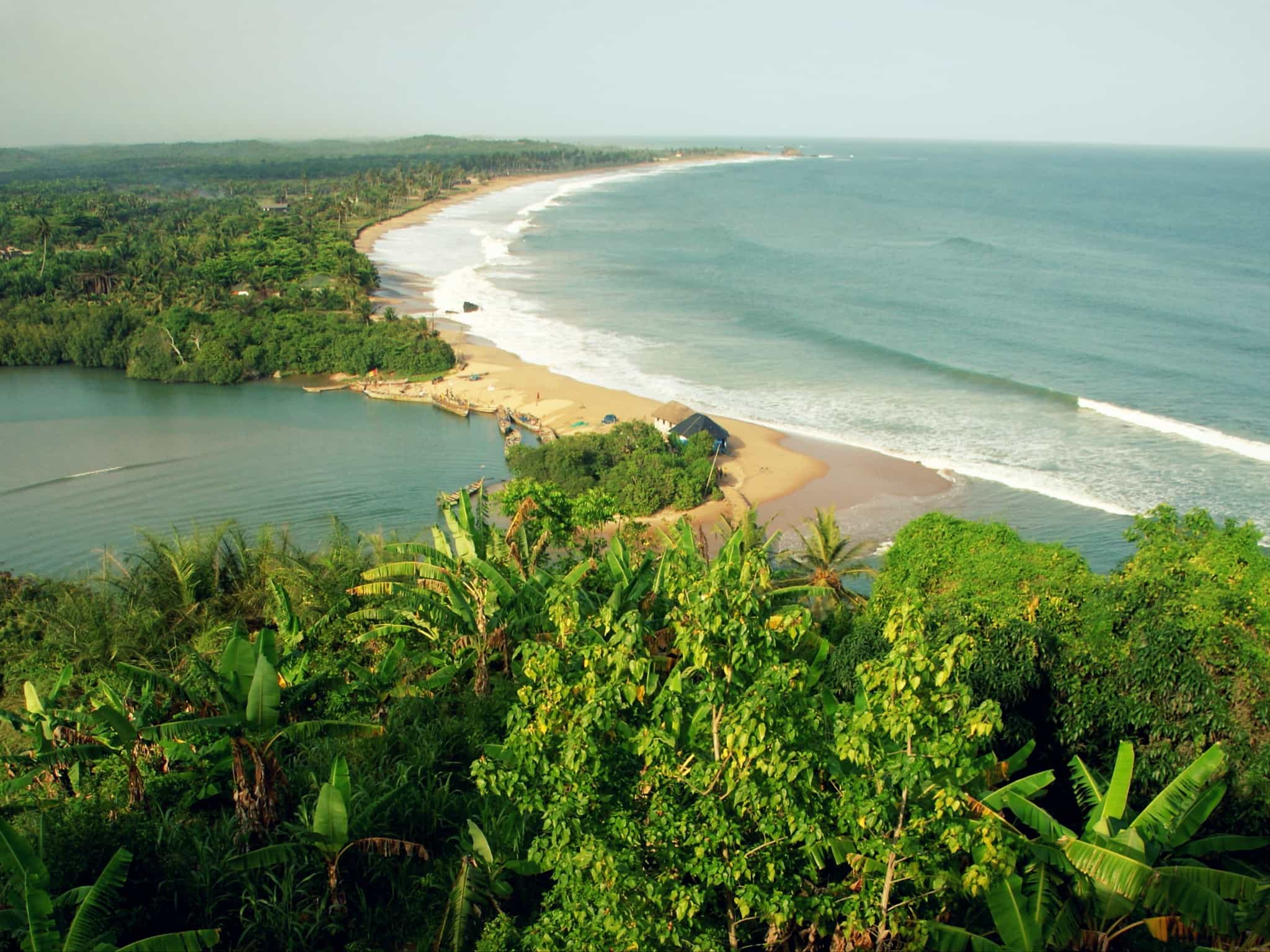
Wild Ghana: Journey into the Ashanti Kingdom
An epic adventure in West Africa – hiking, pedalling and paddling between wild savannah, remote villages and colourful Ashanti festivals
What's Included?
Activities & Certified Guides
All itinerary activities with expert, local, English-speaking guidesAll accommodation
10 nights in locally-run hotels and guesthousesMeals
All breakfasts, 6 lunches and 6 dinnersTransfers
To and from the airport and everything in betweenEquipment & Permits
All your cycling and kayaking equipment plus all park permits and local taxesSmall Like-minded Groups
Solo-friendly by design, join our small n’ sociable groups of up to 14 like-minded, active and outdoorsy people…
…
What's it like?








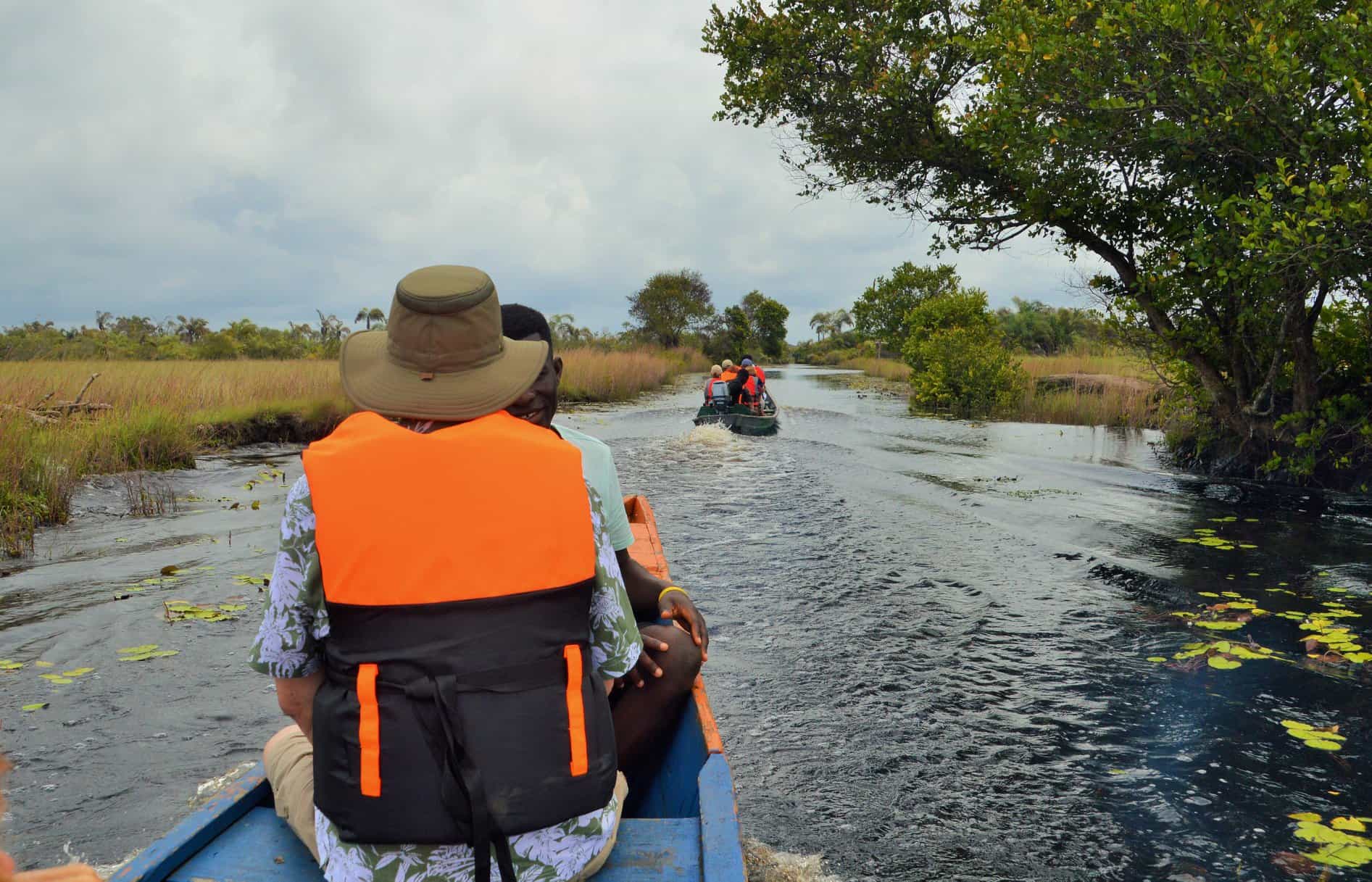
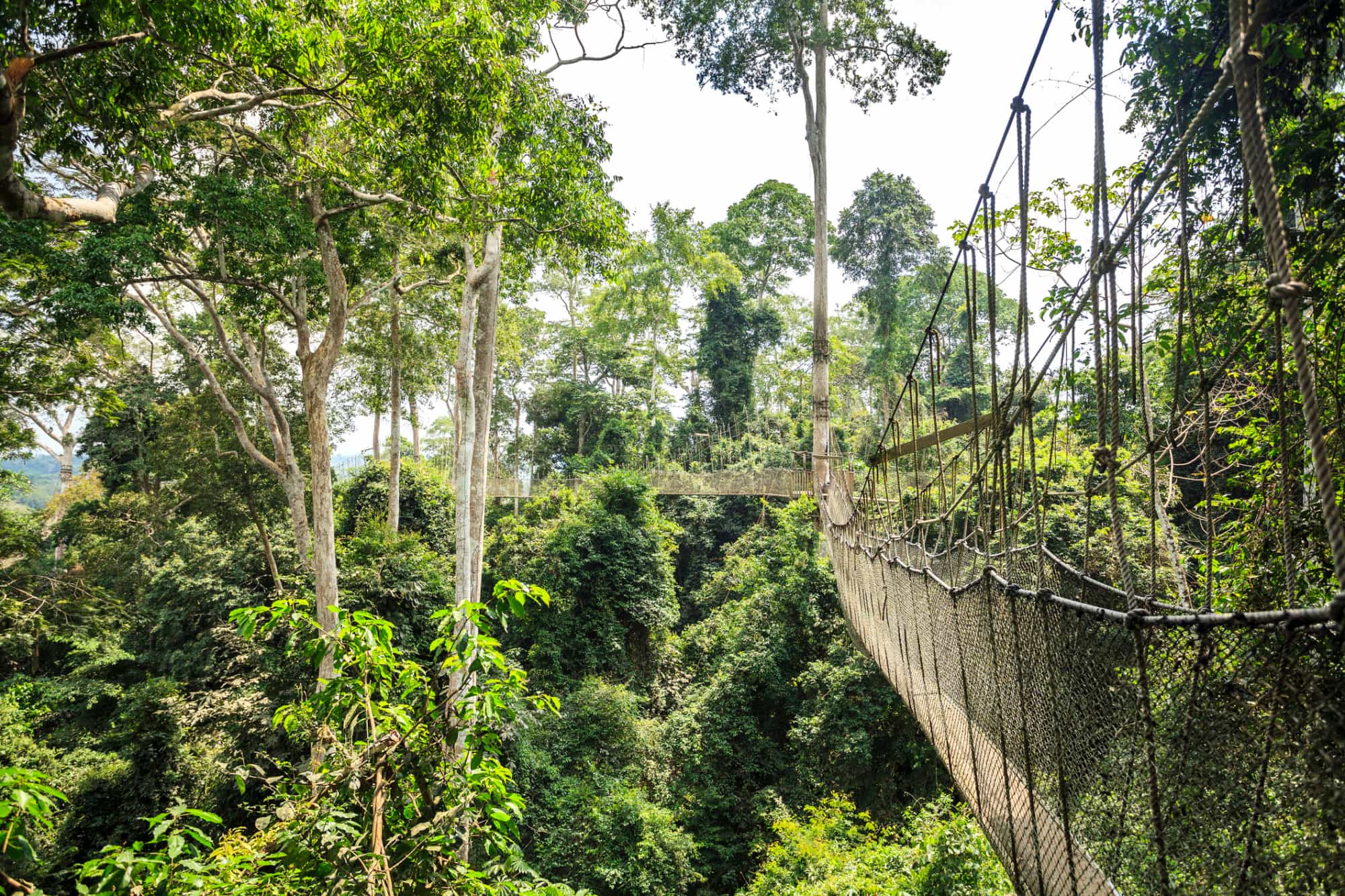
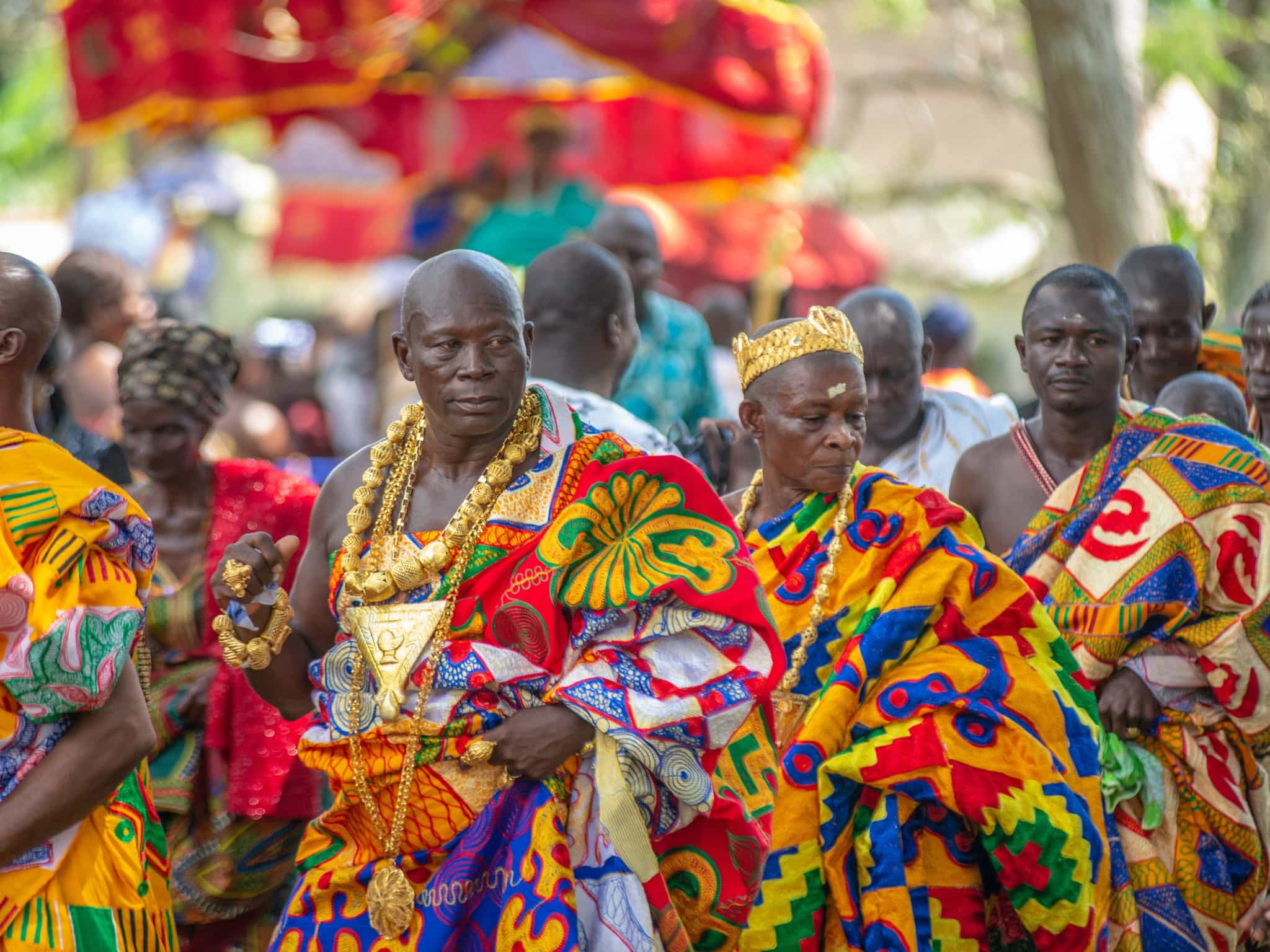
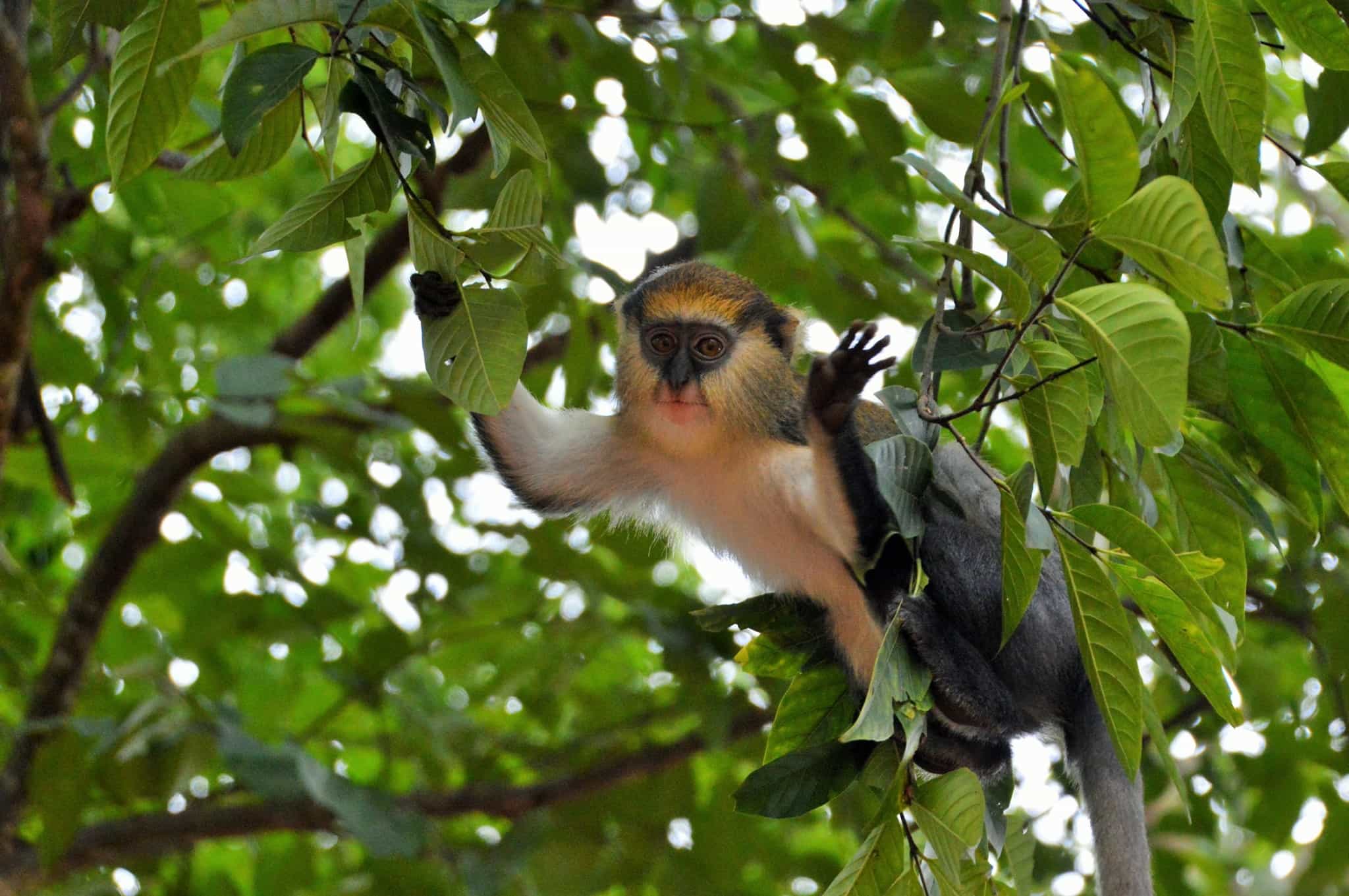
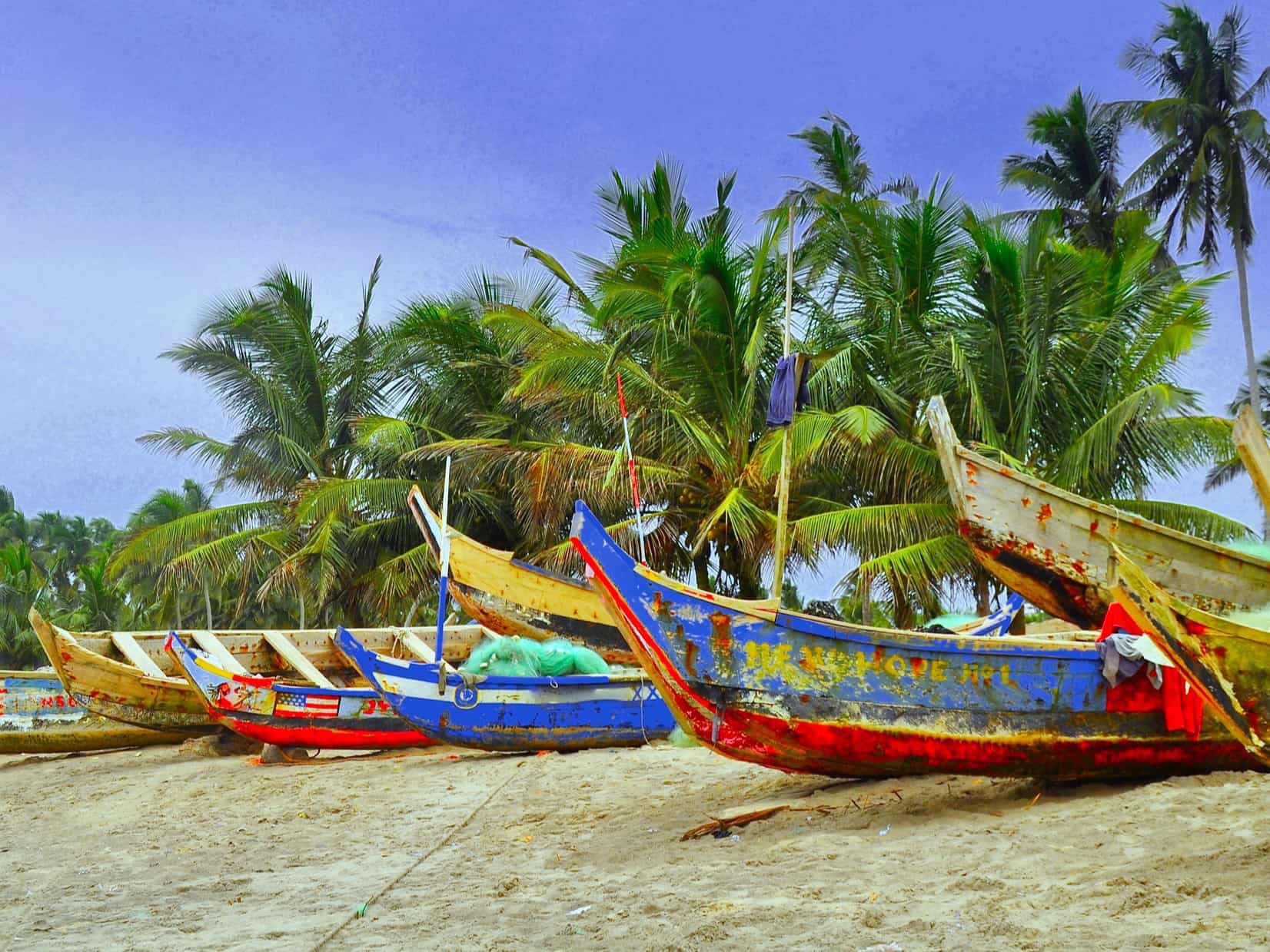
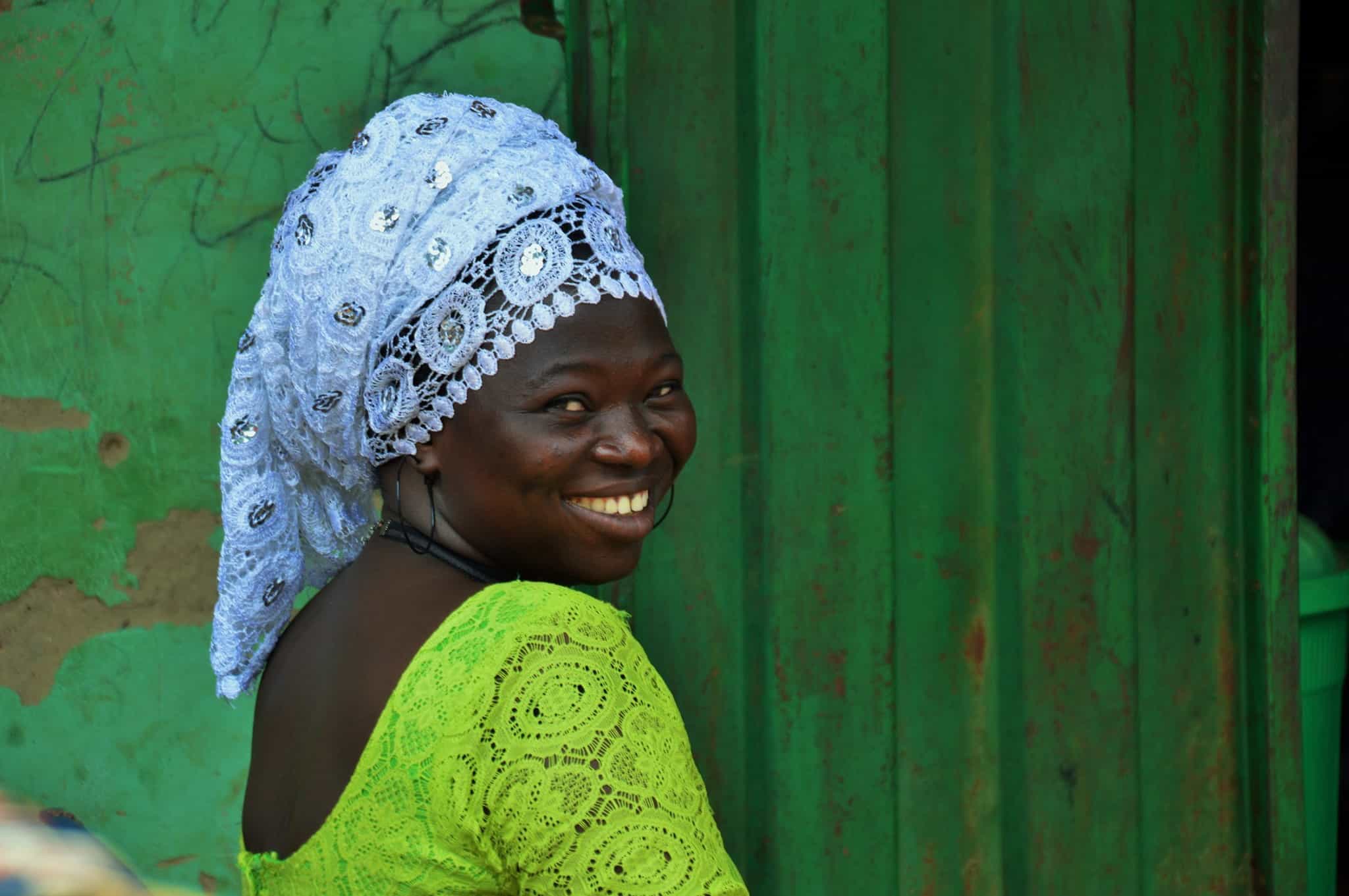
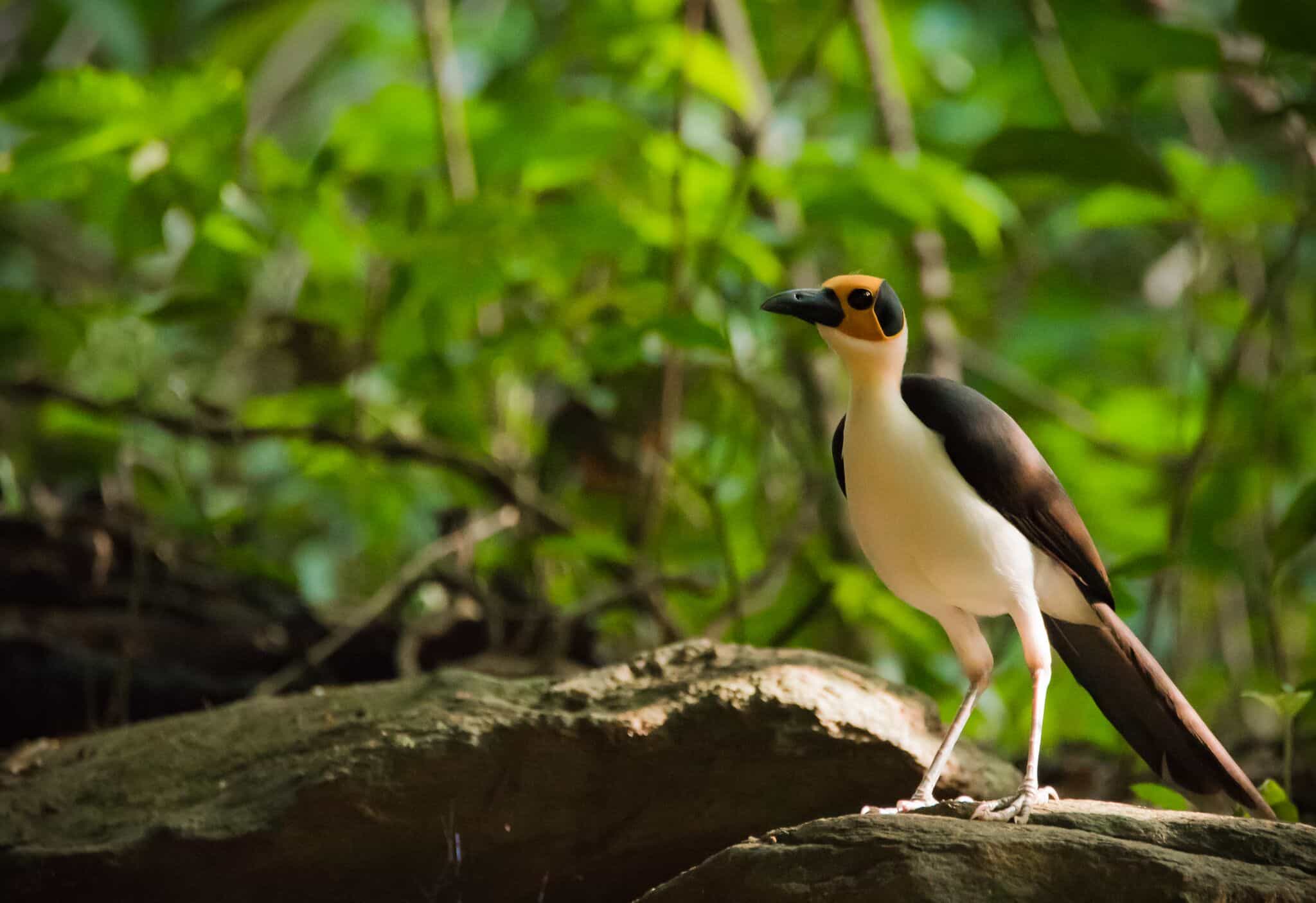
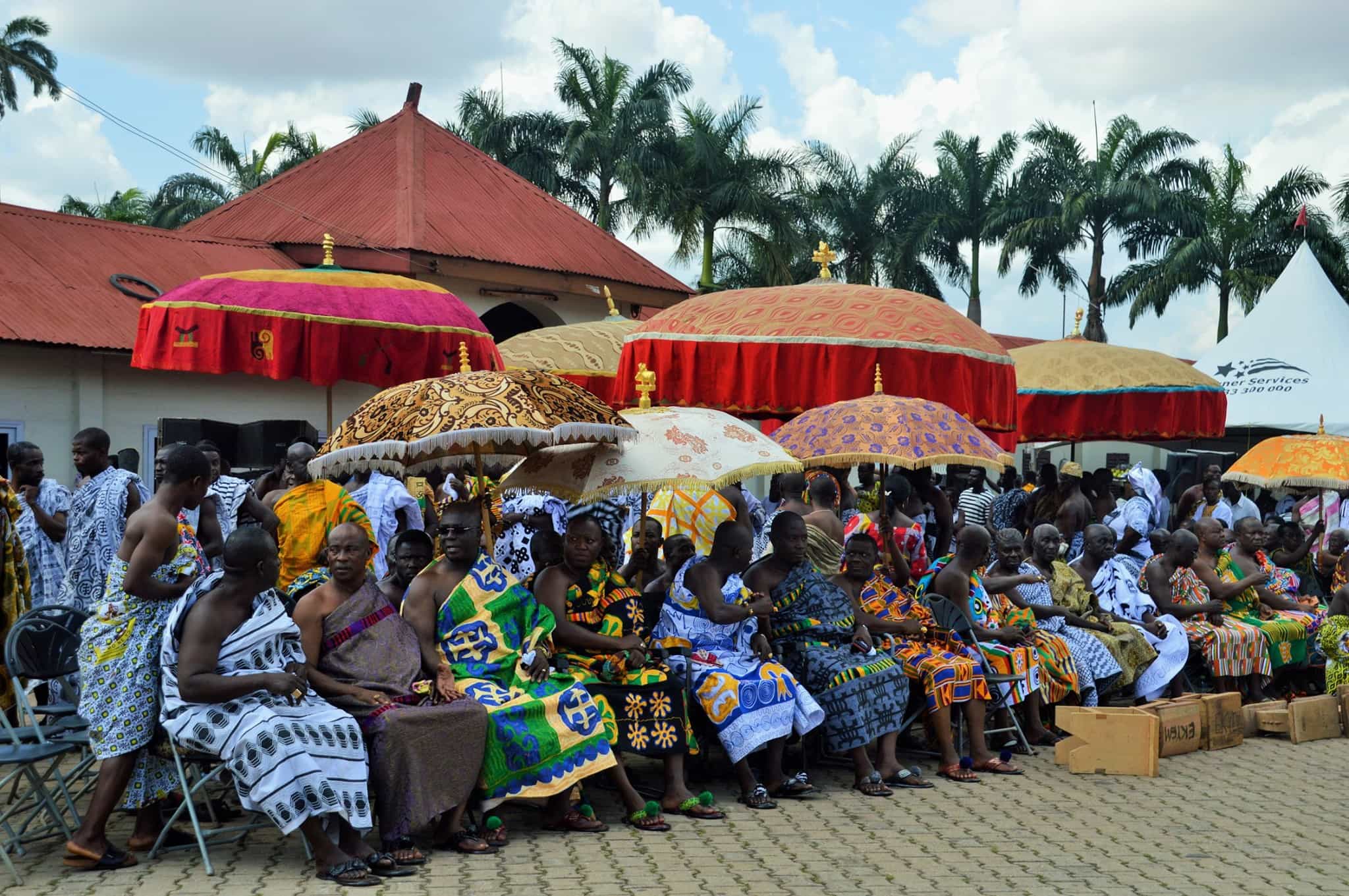
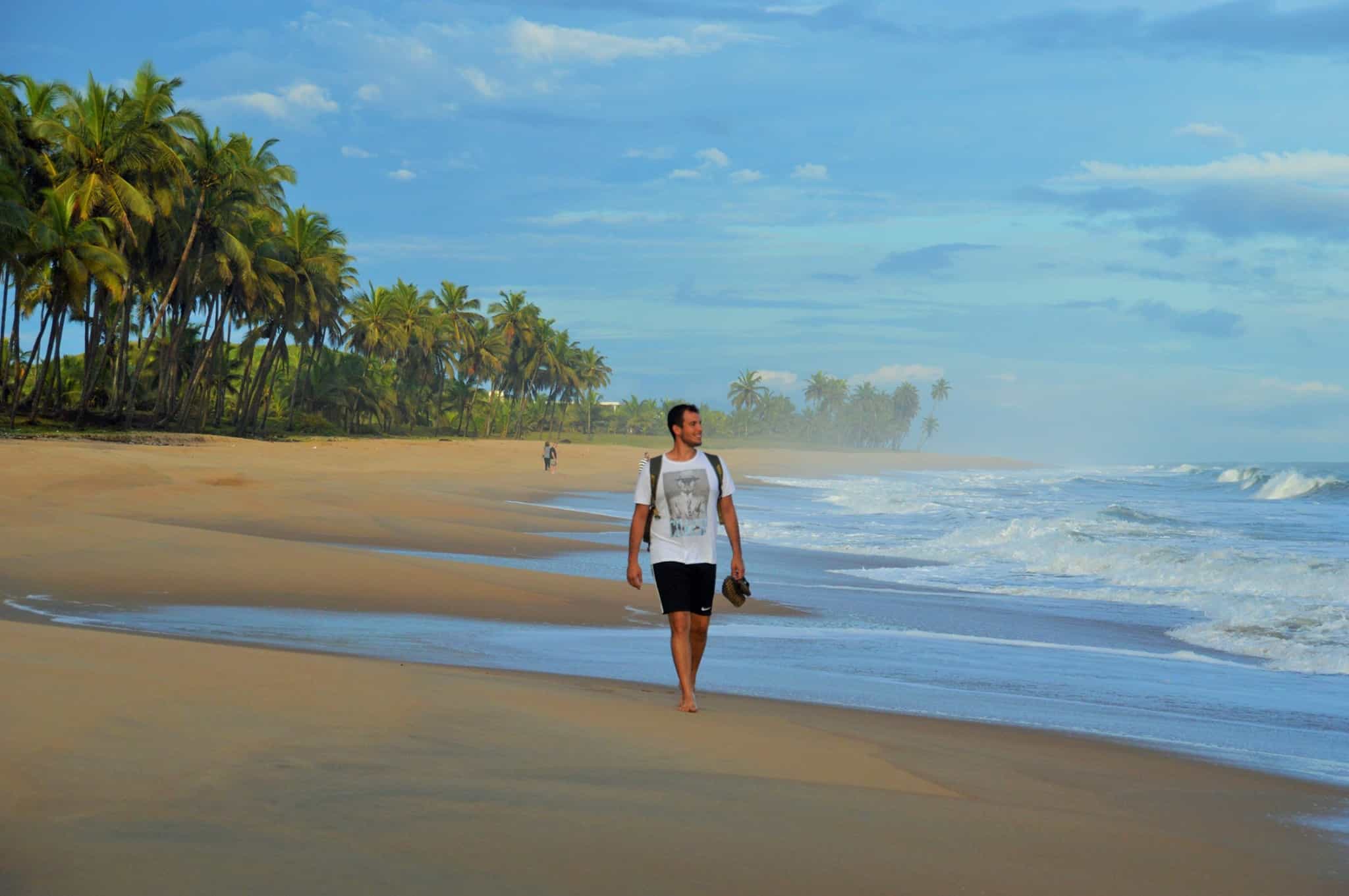
Explore the best wild spots of southern Ghana as you overland from the mighty Volta River to the pristine forests of Ankasa and Kakum
Immerse yourself in authentic village life and attend the incredible Akwasidae Festival, the Ashanti Kingdom’s most celebrated event
Climb to the highest point in Ghana, swim beneath West Africa's tallest falls and spot elusive pangolins and rare birds in protected habitats
Clamber along the epic canopy walkway in Kakum National Park in total solitude at sunrise, and wander along tropical palm-fringed shores
Key Information
Day 1
Welcome to Accra
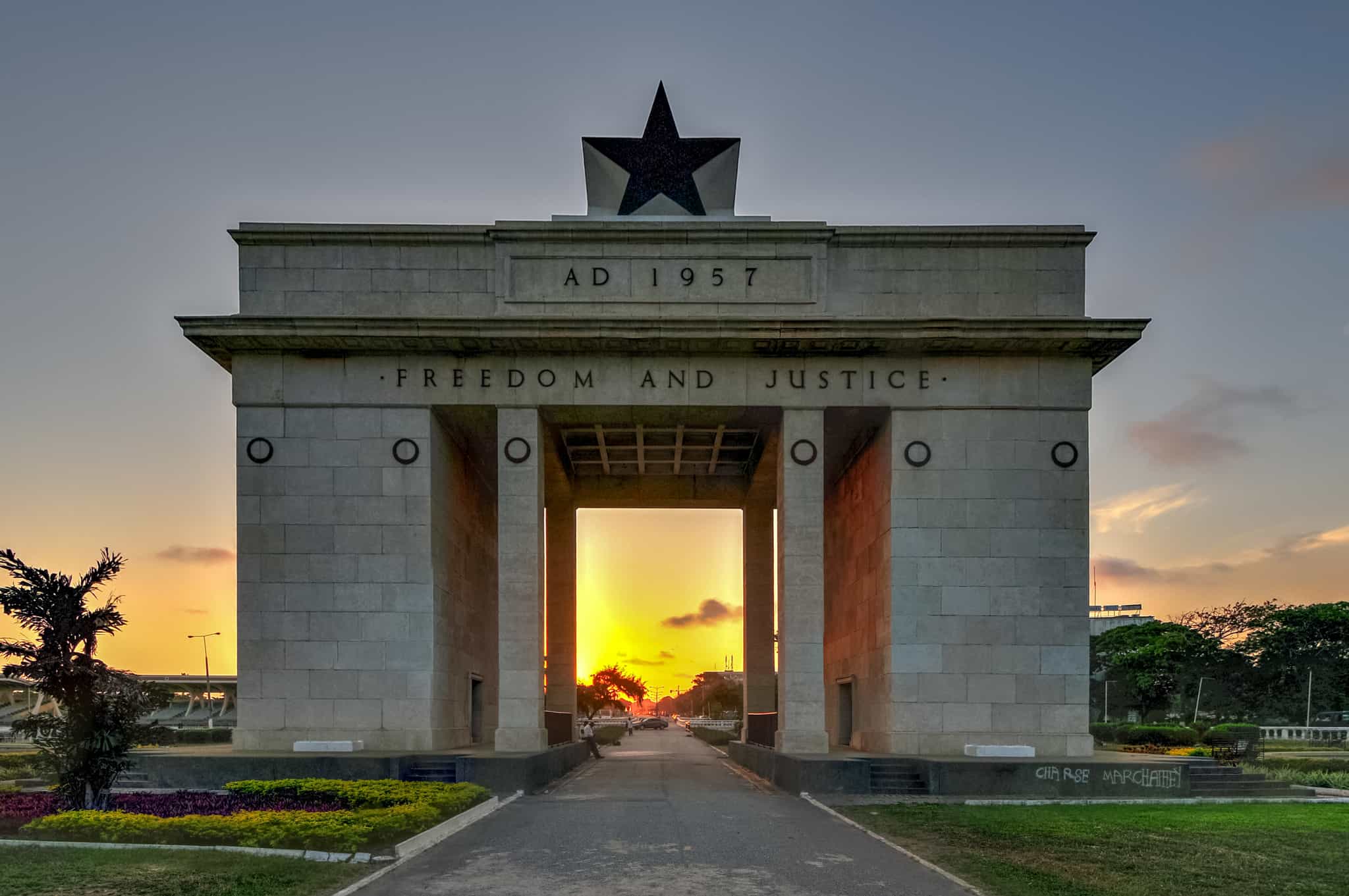
Akwaaba – welcome to Ghana! Your adventure begins in Accra, situated on the beautiful Gold Coast. Buzzing with a vibrant energy and packed with incredible wild spots, diverse wildlife, intriguing Ashanti culture, gorgeous beaches and friendly communities, Ghana is without a doubt the most accessible introduction to West Africa. Hop on a short transfer from the airport to your charming boutique hotel in the city centre, where later you'll meet your guide and fellow adventurers for a welcome briefing. If you arrive early enough, you can enjoy a relaxing group evening meal whilst acclimatising yourself to West Africa. Otherwise, you can kick off your epic overland journey tomorrow morning.
Day 2
Shai Hills Reserve and the mighty Volta River
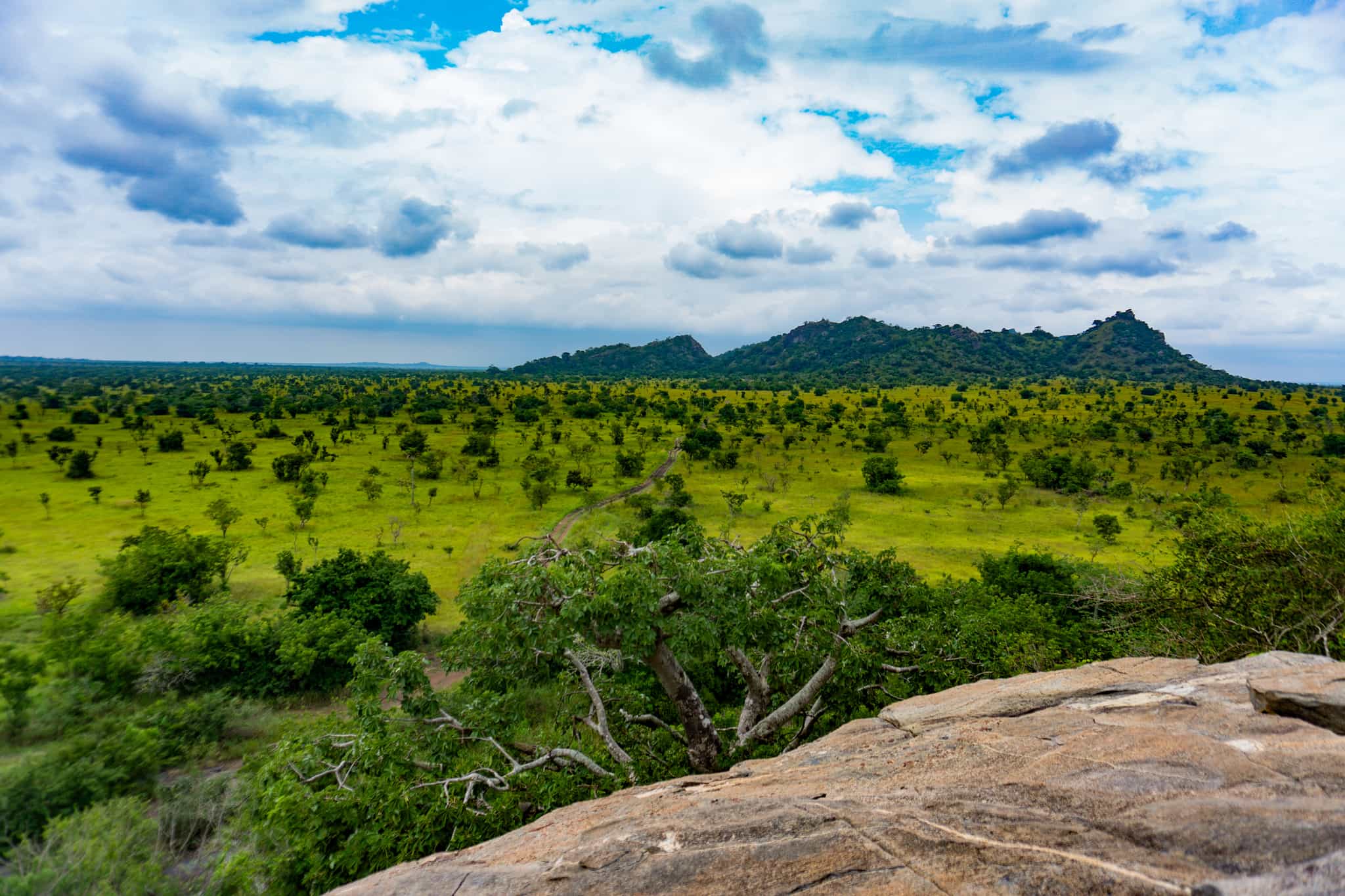
Hiking
Kayaking
Driving
Leave the busy capital city behind this morning and head for the open grassland savannah of the Shai Hills Reserve, where you'll enjoy a full morning of hiking with the beautiful backdrop of ancient rock formations and the Shai people’s ancestral caves. Climb some rocks for amazing views and learn about the history of one of the eight Dangme tribes existing in southeastern Ghana. Keep your eyes peeled for the many species of birds that inhabit this region, including colourful rollers and bee-eaters in addition to antelopes and olive baboons. This afternoon you'll transfer to Akosombo, on the banks of the mighty White Volta River, which will be your base for the next two nights. Enjoy a wonderful evening as you set off river kayaking, immersed in peaceful natural surroundings as the sun sets.
Day 3
Epic mountain tops and cooling waterfalls
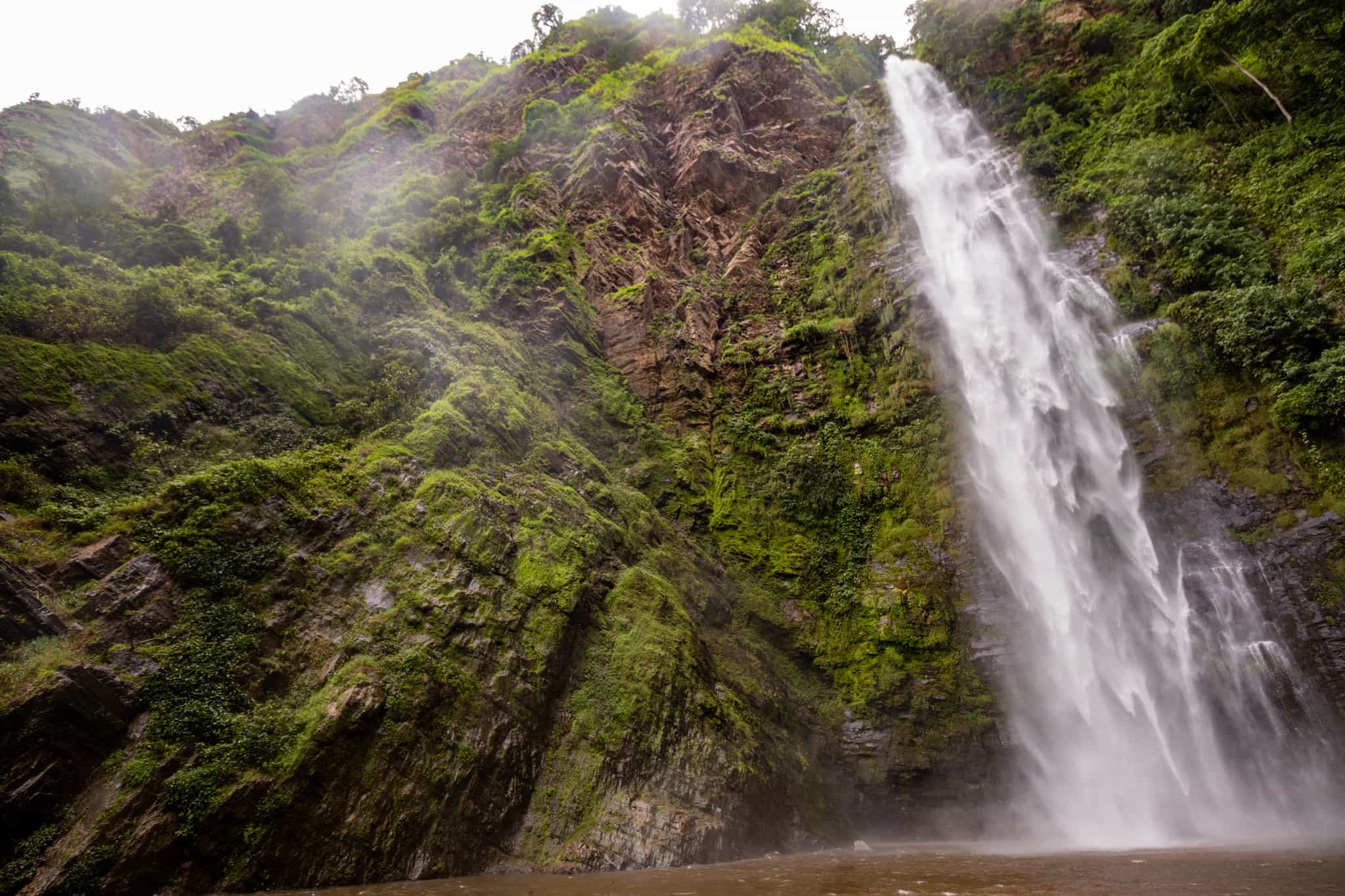
Hiking
Driving
Set off early after breakfast on a two-hours drive north, to Mount Afadjato – Ghana’s highest mountain at an elevation of 885m. Led by your expert guide, you'll have the chance to spot rare butterflies and birds, learning about Ghana’s flora and fauna as you climb some steep and rugged trails. Once at the top, your efforts will be rewarded with dramatic views, which on a clear day stretch out as far as neighbouring Togo. After descending the mountain, stop for lunch in the nearby Wli village before hiking through a thick semi-deciduous forest towards the Wli Falls. Believed to be the highest waterfalls in West Africa, the falls are nestled in the idyllic Agumatsa wildlife sanctuary. As you approach, you can hear the sounds of the enormous colony of straw-coloured fruit bats on the adjacent cliffs and with the powerful rush of the river. Cool down with a swim in the natural pool or if you're feeling up for it, there is also the option to hike to the upper falls to enjoy more epic views. Rest your legs in the late afternoon as you drive back to your riverfront accommodation in Akosombo, then prepare for the long journey north tomorrow.
Day 4
Journey to Bosumtwi, Ghana's only natural lake
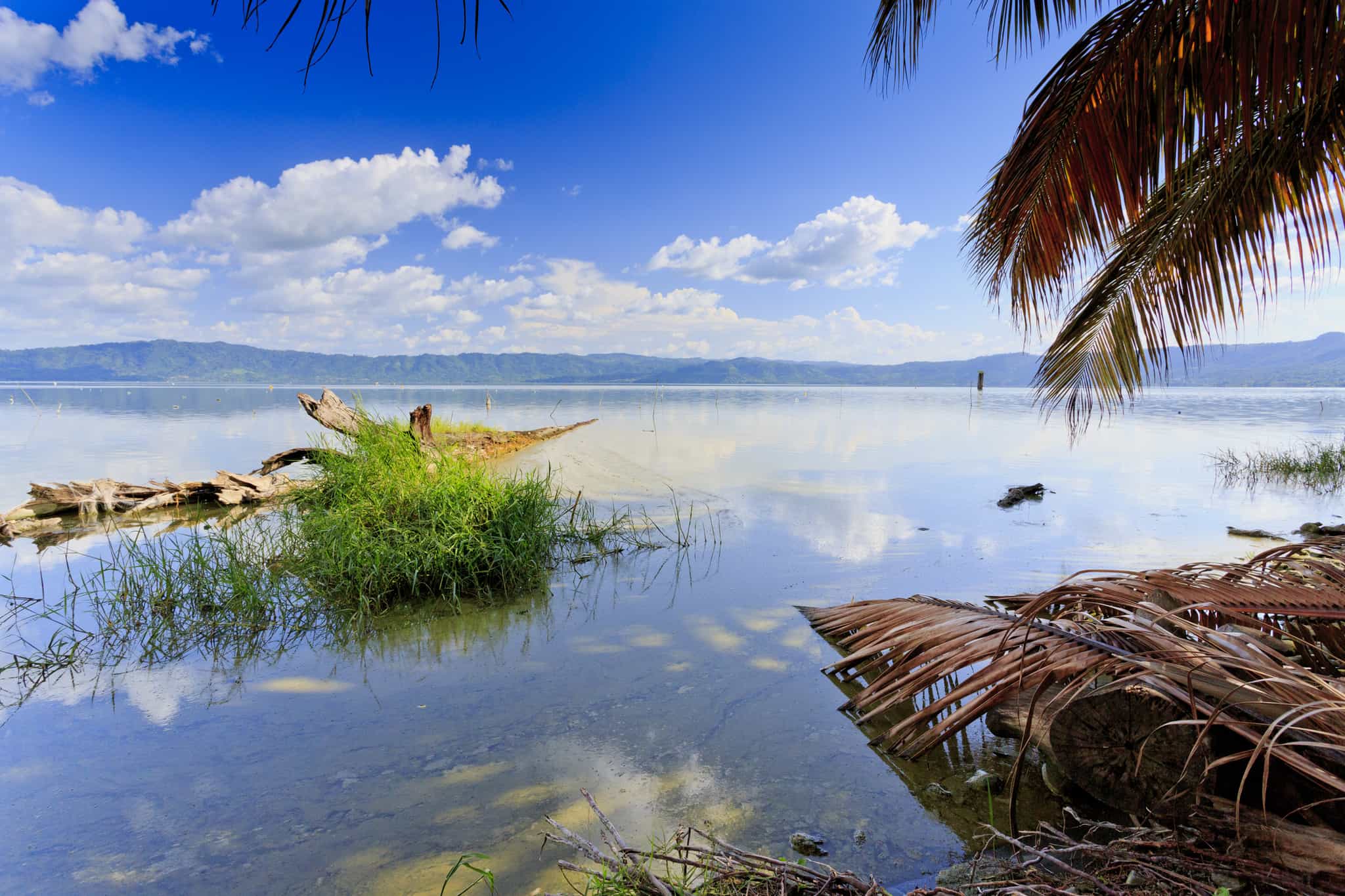
Cycling
Driving
Another early start this morning – after breakfast, set off towards Lake Bosumtwi. Drive first into the beautiful Akuapem Hills, admiring the outstanding views across Accra and Tema in the distance. After a tasty early lunch break, you'll continue your journey north, reaching Bosumtwi – Ghana’s only natural lake, believed to have been created by a meteorite. Check in to your lakeside accommodation, then join your guide on a scenic afternoon bike ride for stunning views across the lake as the sun sets over the distant hills – the perfect way to end the day.
Day 5
Akwasidae Festival celebrations in the Ashanti capital of Kumasi
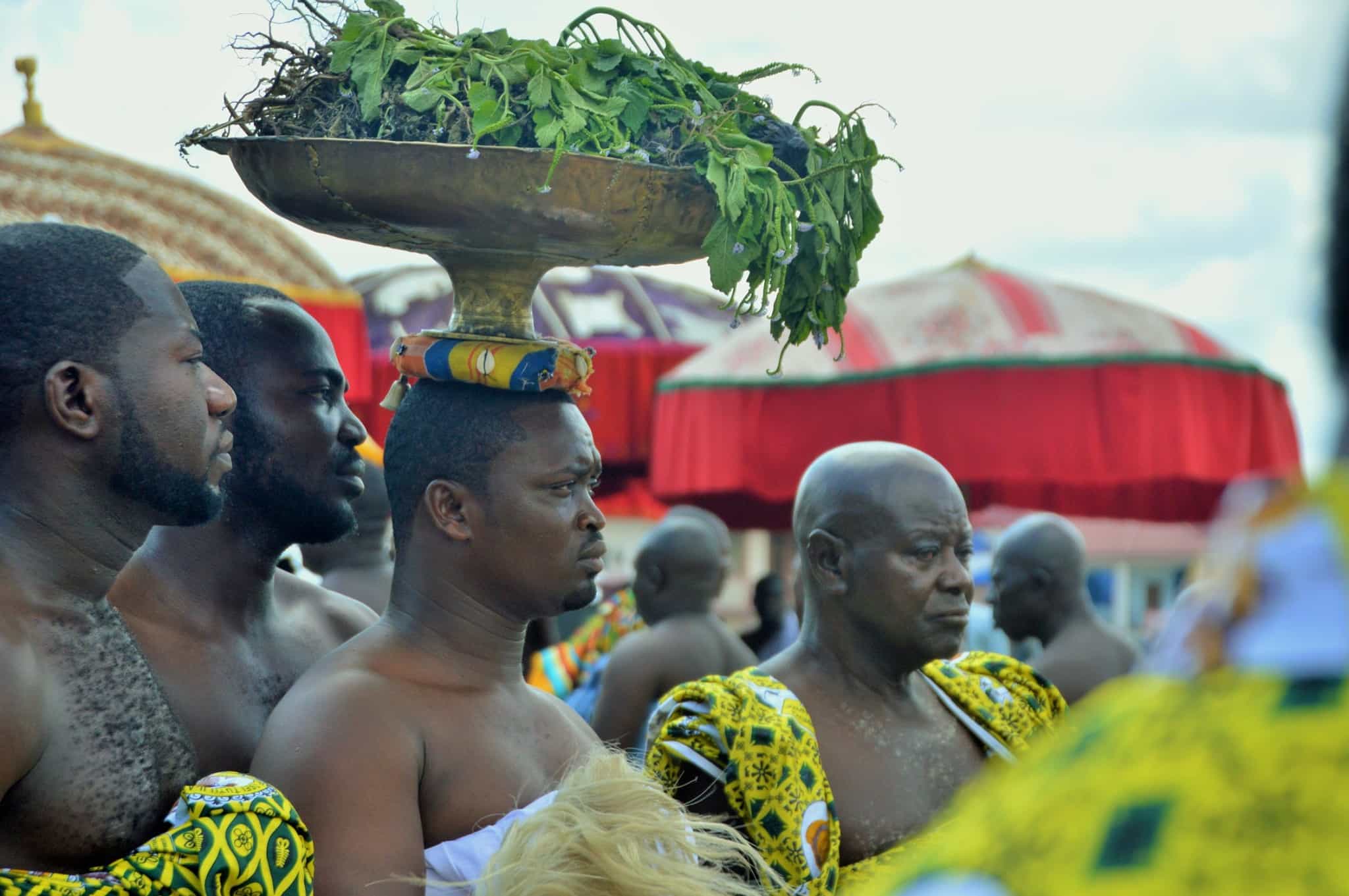
Driving
This morning you are off to Kumasi, the ancient capital of the Ashanti kingdom which has been hosting one of Africa’s most fascinating cultural events for centuries. Today you'll have the incredible opportunity to join the Akwasidae celebrations, which happen every 42 days (every sixth Sunday). Get a real insight into the rich and vibrant culture of the Asanteman Kingdom as you watch paramount, divisional and sub chiefs of the Asanteman pay homage to the king, all adorned in rich, colourful and traditional kente and adinkra cloths. It’s a spectacular visual feast, chock-full of African-style pomp where traditional drumming and dance accompany the proceedings and gifts are offered to the Asantehene. After spending time with the King, enjoy a late lunch at a local restaurant serving a wide selection of West African dishes, before heading back to Lake Bosumtwi. Back at the lake, choose either to relax or take a short walk in the surrounding natural habitat overlooking the lake.
Day 6
Remote village life, picathartes and pangolins
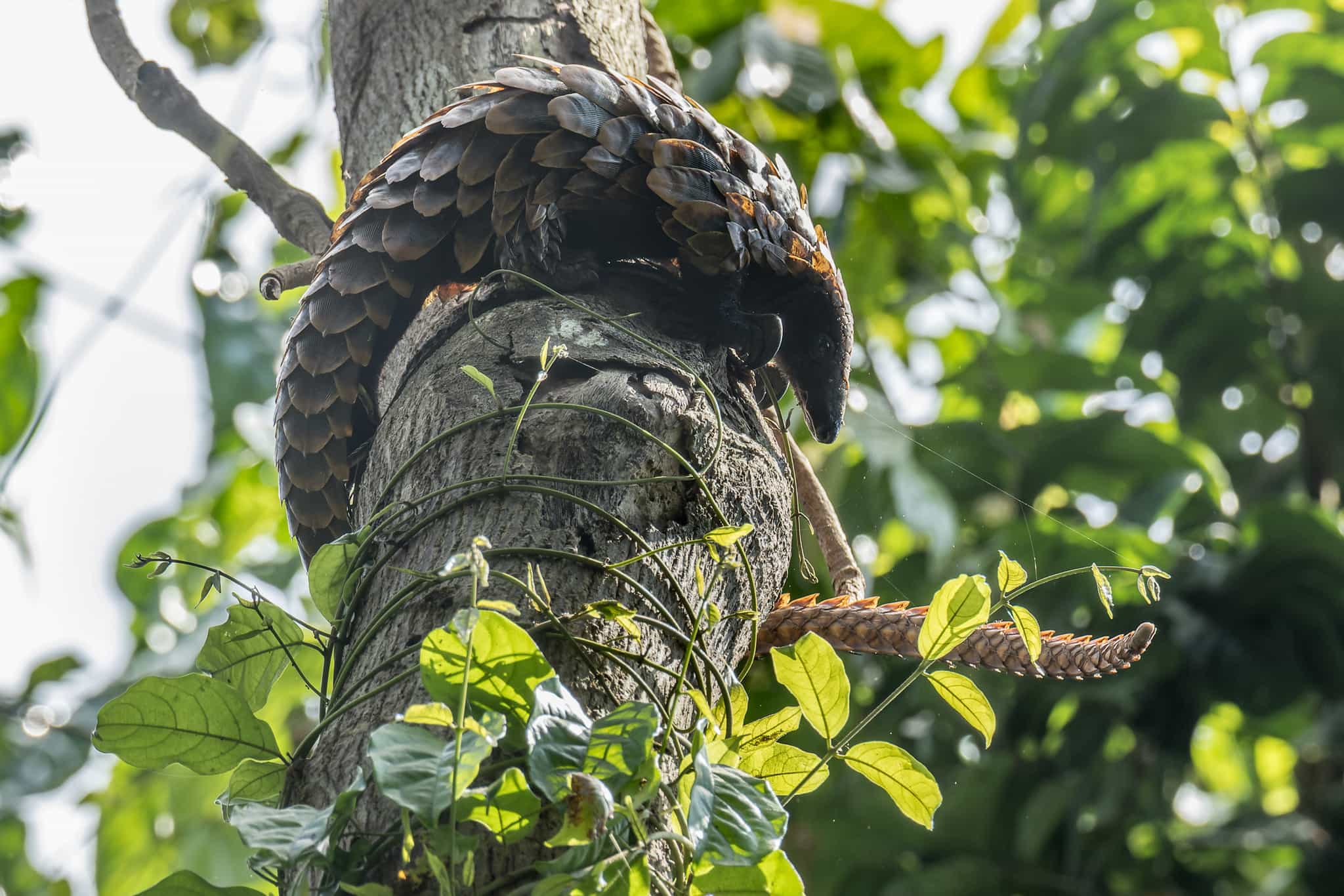
Hiking
Cycling
Driving
Set off after breakfast, driving south towards the remote village of Bonkro. Before you reach the village, you'll switch from the van to bikes, cycling the remainder of the way there. Your local host has a strong connection with this community, working closely with the people that live here to support the protection of the surrounding rainforest and local wildlife. During your time in the village, you'll have the chance to visit the local representative of the Kuapa Kokoo Co-operative, a fair-trade organisation that ensures its members get a good price for the sale of their cocoa and actively promotes women in business. Learn about the entire cocoa production process, from planting to harvesting, then after lunch, head into the forest to see the special white-necked rockfowl (picathartes) nesting site. Hiking to the boulders and seeing these endangered birds hopping into their mud nests to roost is a once-in-a-lifetime wildlife encounter, twice filmed by Sir David Attenborough. With some luck, you may even come across the elusive pangolin, as sightings are very common in this area. After a wonderful day of adventure, relax back at your guesthouse and enjoy a special African movie night at an outdoor cinema built by your host, joined by other local villagers who just love to mingle with visitors.
Day 7
To Ankasa Conservation Area, Ghana's most pristine rainforest
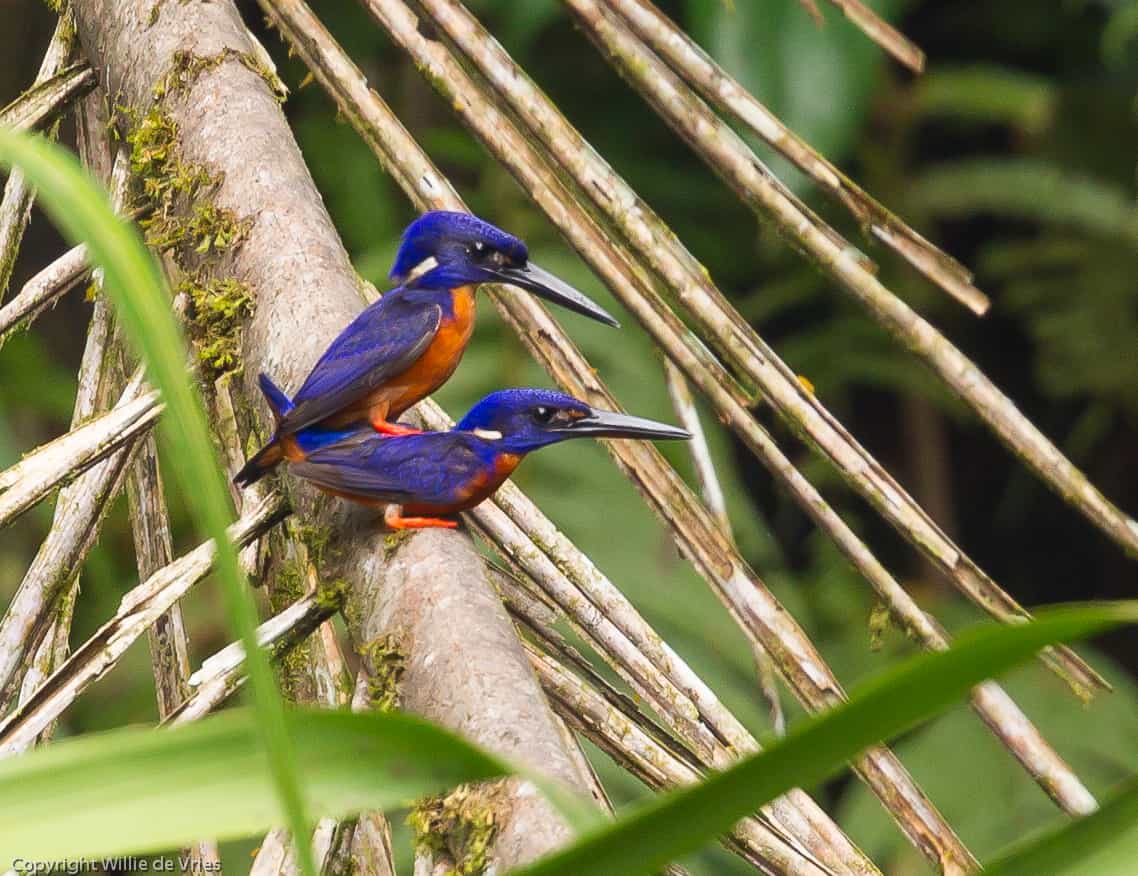
Bush Walking
Driving
Settle in for a long drive today. You'll be heading to the Ankasa Reserve in the westernmost region of Ghana, close to the border with Ivory Coast. You'll be on the road for most of the day, with a few stops planned to stretch your legs. One of these stops will be Cape Coast Castle, a UNESCO World Heritage Site. This is an important, thought-provoking monument where you can learn about a harrowing period in the region’s history – it was here that more enslaved African captives were held than any other place in West Africa. The castle still preserves its macabre dungeons and the infamous 'door of no return' while the museum inside gives an informative and emotional insight into the dark history of slavery and colonisation – it should not be missed. You'll then continue to Ankasa arriving at your lodge in the late afternoon. Ankasa is by far Ghana’s finest remaining rainforest habitat, with an area of over 500 square kilometres of pristine, evergreen, Upper Guinea rainforest, protecting many endangered mammals and animals such as the bongo, forest elephant, three species of pangolin and several species of primate. There are also over 200 species of wonderful birds, more than 600 species of butterflies and 800 species of plants, some of which are rare and endemic to the area. Freshen up and enjoy a meal at your lodge, before joining the local rangers on a night walk in the forest – eyes peeled for secretive nocturnal creatures.
Please note that depending on timings, the night bush walk may be done on the second evening in Ankasa.
Day 8
Cycling, hiking and wildlife spotting in the Ankasa Reserve
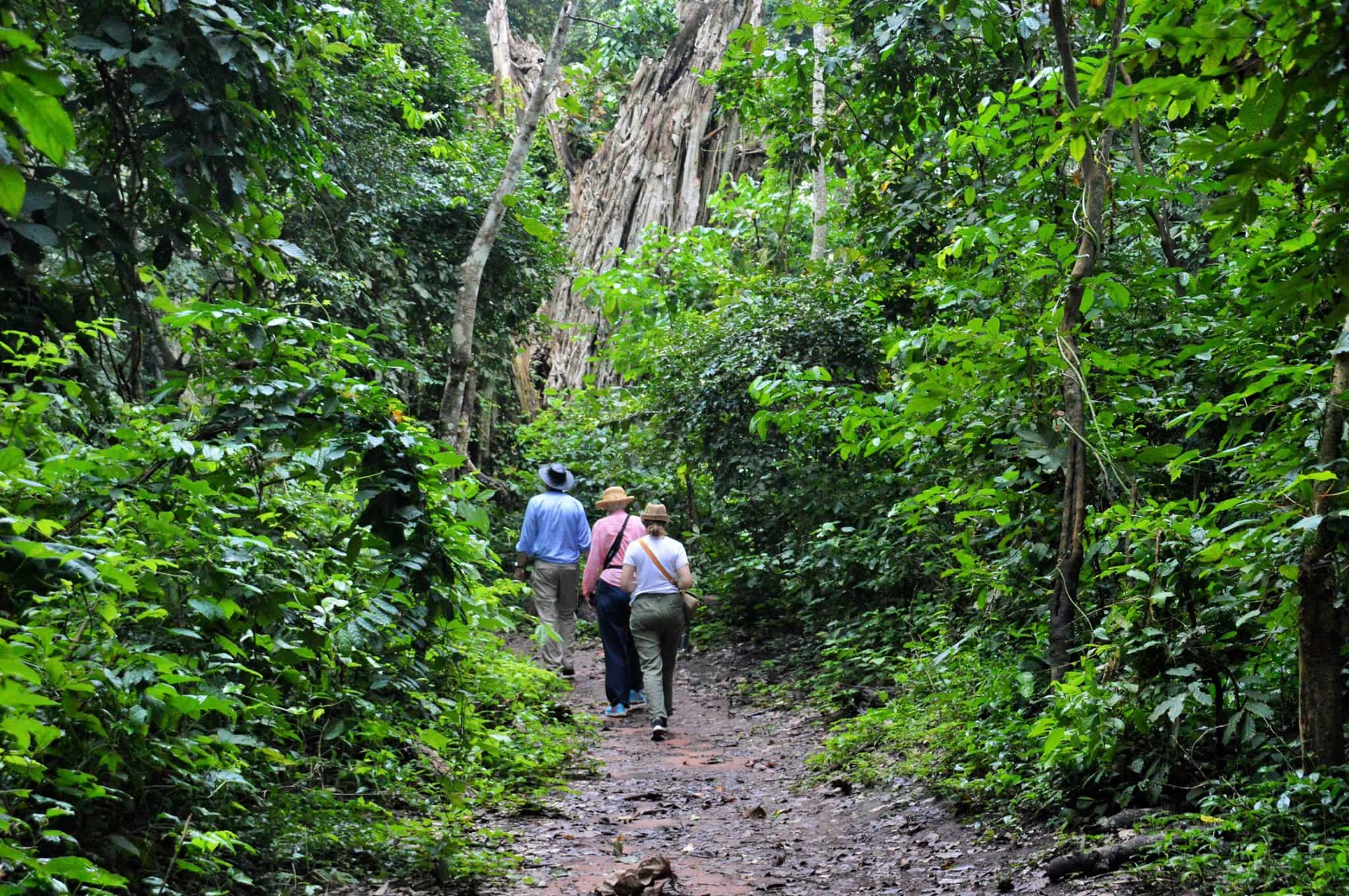
Cycling
Hiking
Enjoy a beautiful morning, waking up close to nature by this wonderful forest habitat. After breakfast you'll hop on a bike and cycle the relatively easy forest trails to reach the unique Bamboo Cathedral, located approximately 9km inside the forest. The morning is then dedicated to learning about the local flora and fauna with your rangers. Lunch will be back at the accommodation, where you can spend some time relaxing before heading out again in the afternoon to visit a remote village on the outskirts of the forest. This is the Ghana most visitors do not see – a community of mainly farmers living in homes made from the earth, who trade their produce at the local markets. If you prefer to be more active, you can also enjoy a hike in the forest. Enjoy a chilled evening listening to the sounds of nature back at your lodge, then get a good night's sleep as you'll leave Ankasa early tomorrow.
Day 9
From Nzulezu Stilt Settlement to tropical beaches
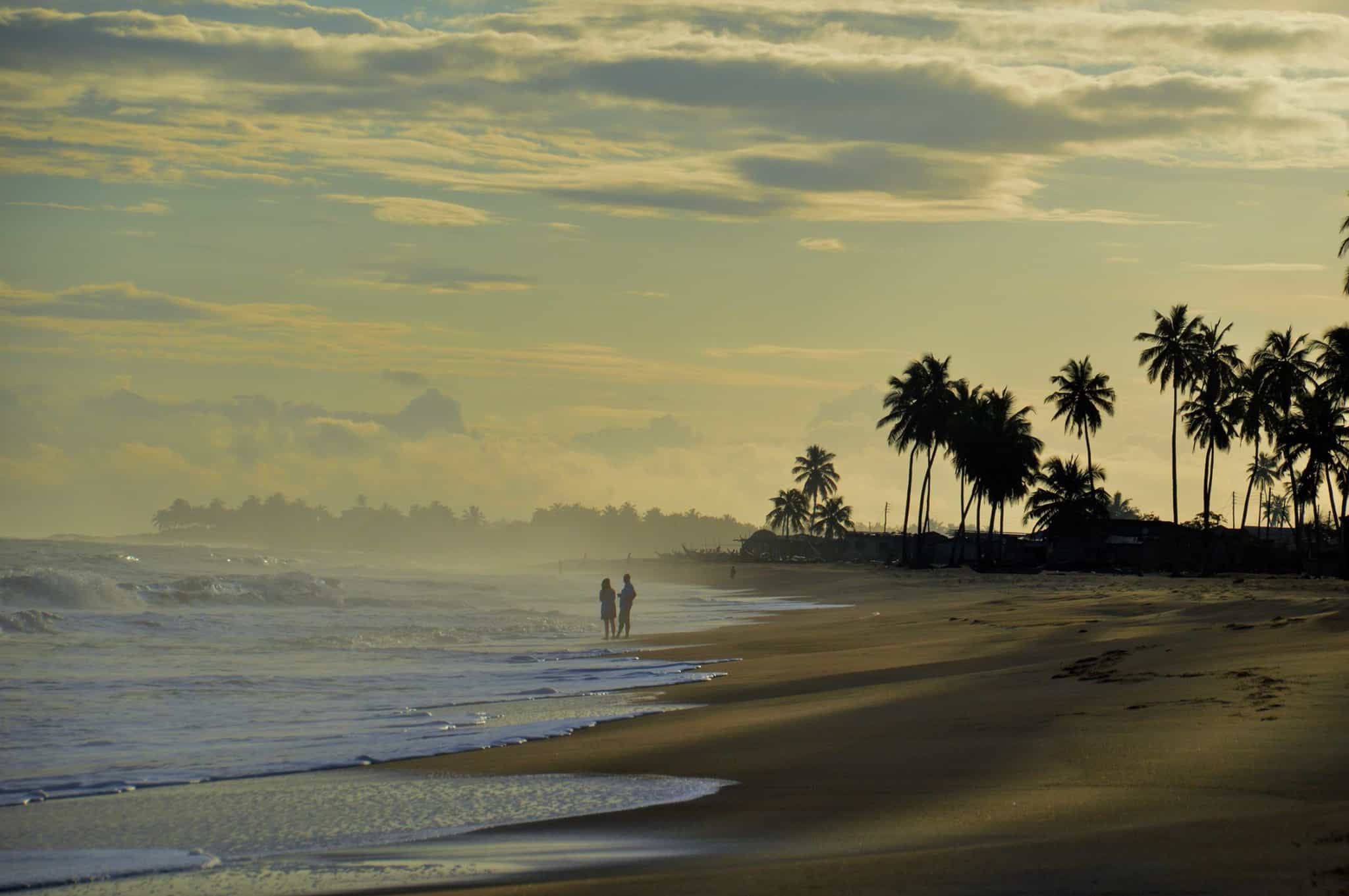
Kayaking
Driving
Bid farewell to Ankasa to head eastwards along the coast. En route you'll stop in Beyin to get into a traditional dugout canoe, setting off through the beautiful Amasuri wetlands to reach Nzulezu Stilt Village, an isolated community which has been nominated for UNESCO status. Here, traditional village life is adapted to the surrounding watery conditions – all activities or chores pertaining to normal life (such as the pounding of fufu for meals, schooling, worship and burial) are done on the surface of the lake. Reaching the settlement by canoe is a real highlight as the wetlands are truly scenic an important habitat for birds. Your journey continues this afternoon as you drive to Brenu Akyinim, stopping en route to kayak the final few kilometres across a beautiful coastal lagoon, ending on the golden sands overlooking the iconic Gold Coast of West Africa. In Brenu Akyinim, you'll meet the local fishermen and witness the simple life in this small community before walking along the shore to reach your beachfront accommodation, taking the rest of the evening for some well-deserved relaxation.
Day 10
The epic canopy walkway in Kakum National Park
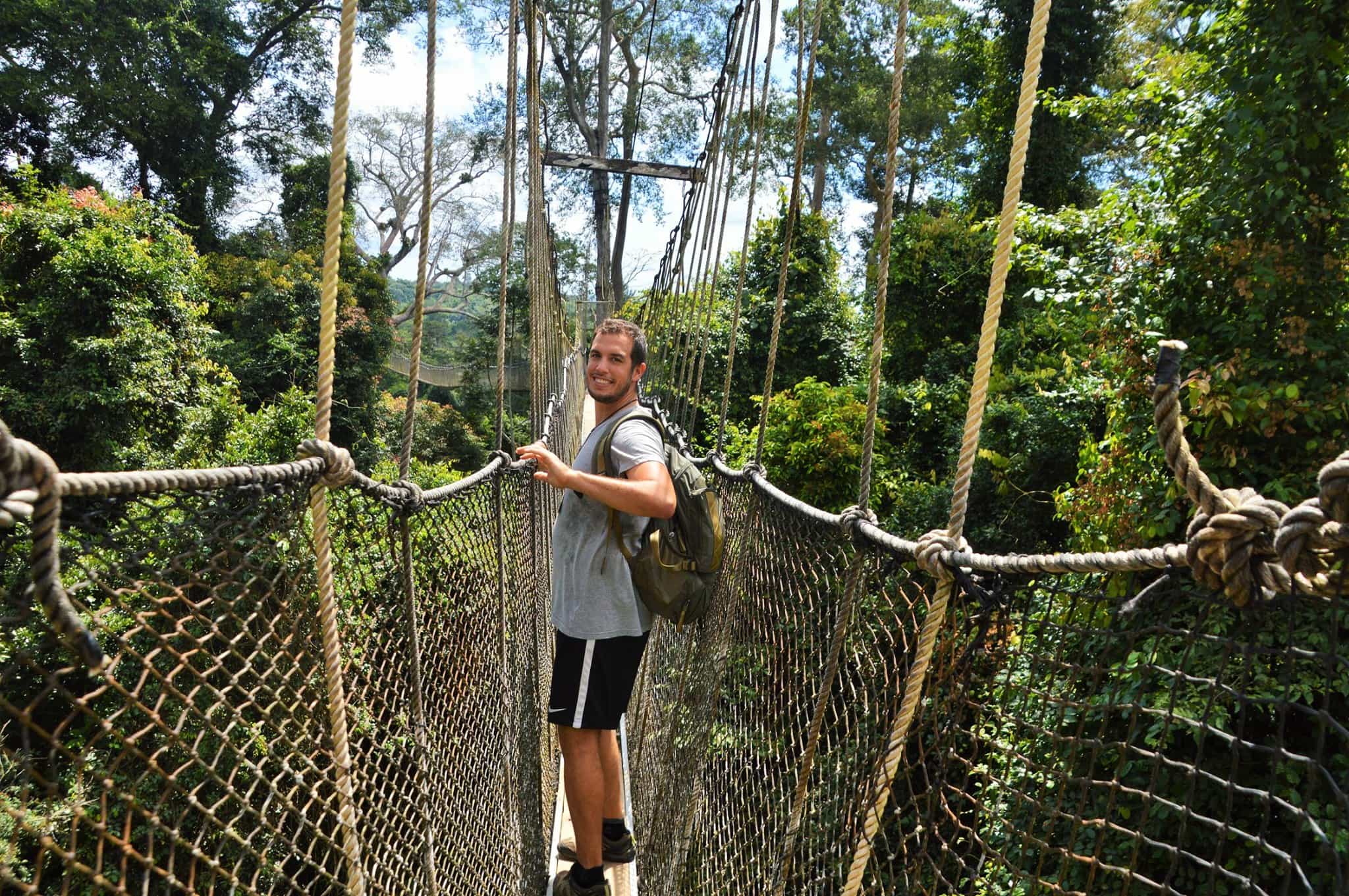
Hiking
Driving
Today's very early start (5am) will be worthwhile, as you'll reach the stunning Kakoum National Park in time for sunrise and before the crowds. The park’s best-known feature is undoubtedly its network of seven suspension bridges. These form a 333m-long canopy walkway, suspended up to 27m above the forest floor between trees that are over 300 years old. As your host has arranged an early opening, you should have the entire walkway nearly all to yourself, making it a very peaceful and spiritual experience. This afternoon, head back to your beachfront hotel and enjoy the beautiful tropical beach. Tonight, you'll enjoy a special farewell dinner around a fire, joined by a traditional Ghanaian music troupe. Try your hand at drumming whilst overlooking the beautiful gold coast of West Africa – the perfect way to end a memorable West African adventure!
Day 11
Elmina Fish Market and back to Accra
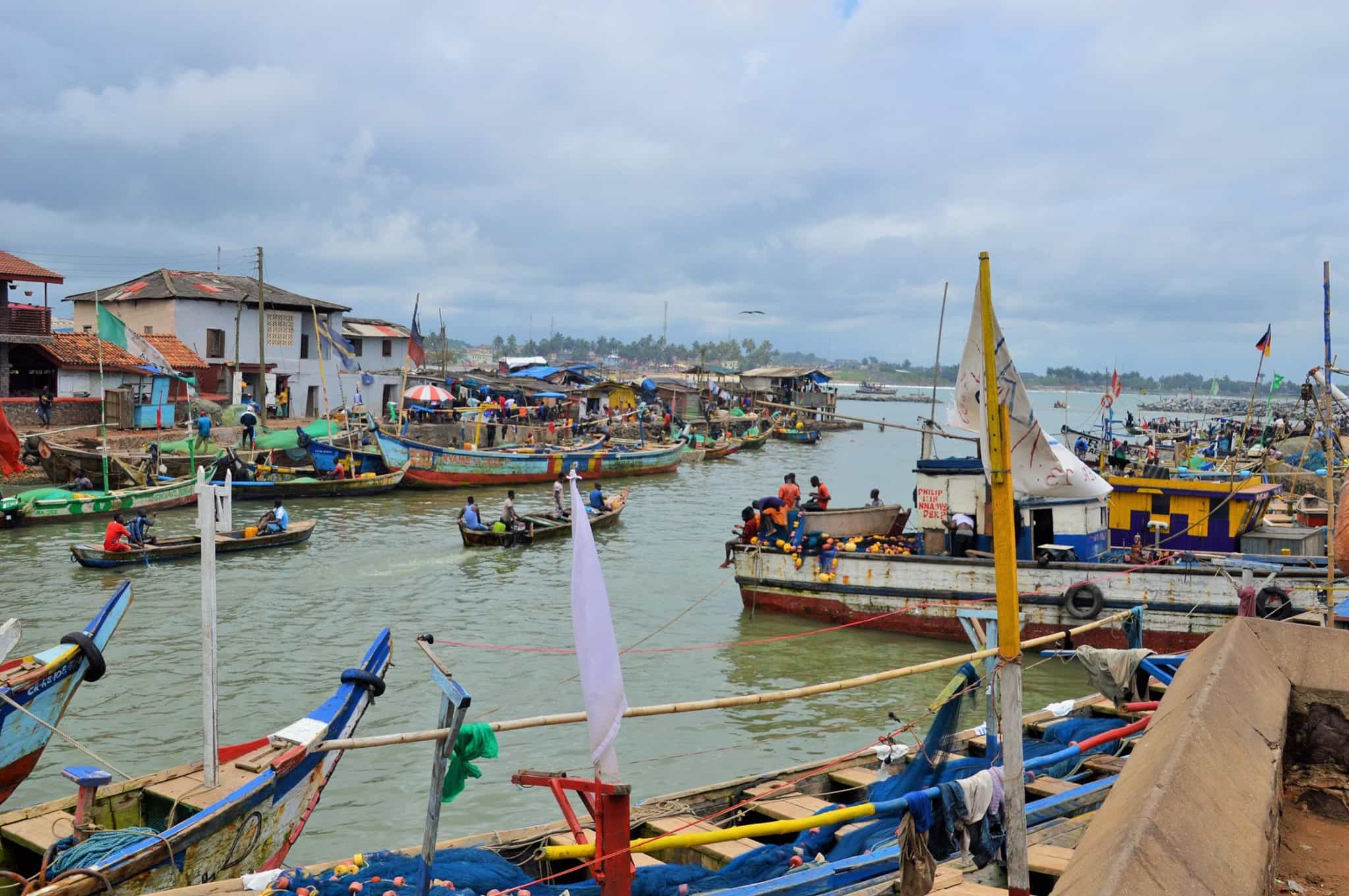
Driving
Enjoy a well-earned lie-in on your final day in Ghana, or take a walk along the beach before breakfast. Freshen up and check out to head back to Accra in time for your evening departure. On the way back to the city you'll make a stop in Elmina, a famous fishing town with a bustling fishing market and a lively community. You'll reach Accra late afternoon, in time for your evening flight back home. That's your adventure completed!
The Area
Logistics
Starts
Accra Kotoka International Airport
Any time on Day 1
Ends
Accra Kotoka International Airport
17:00 on Day 11
Transfers
On Day 1 your host will meet you at the airport at any time, and drive you to your comfortable boutique hotel in Accra. At the end of the trip, there will be one group transfer to the international airport, which is usually scheduled in the late afternoon/early evening. An optional drop off in Accra city centre can be arranged in case you decide to extend your trip.
Arrival and departure transfers are only included in the main price if you arrive on Day 1 and depart on Day 11. If you would like a private transfer outside of these times, this can be arranged with your host for an extra cost – please see Optional Extras for the price.
Travel options
There are direct flights to Accra International Airport from London (usually scheduled daily with British Airways from either Gatwick or Heathrow), as well as alternative indirect routes via Europe, with direct connections from Lisbon, Paris or Amsterdam. Direct flights are also available from the US from Washington and New York.
Day 1
Breakfast
Lunch
Dinner
Day 2 – Day 5
Breakfast
Lunch
Dinner
Day 6
Breakfast
Lunch
Dinner
Day 7
Breakfast
Lunch
Dinner
Day 8
Breakfast
Lunch
Dinner
Day 9 – Day 10
Breakfast
Lunch
Dinner
Day 11
Breakfast
Lunch
Dinner
What is the food like?
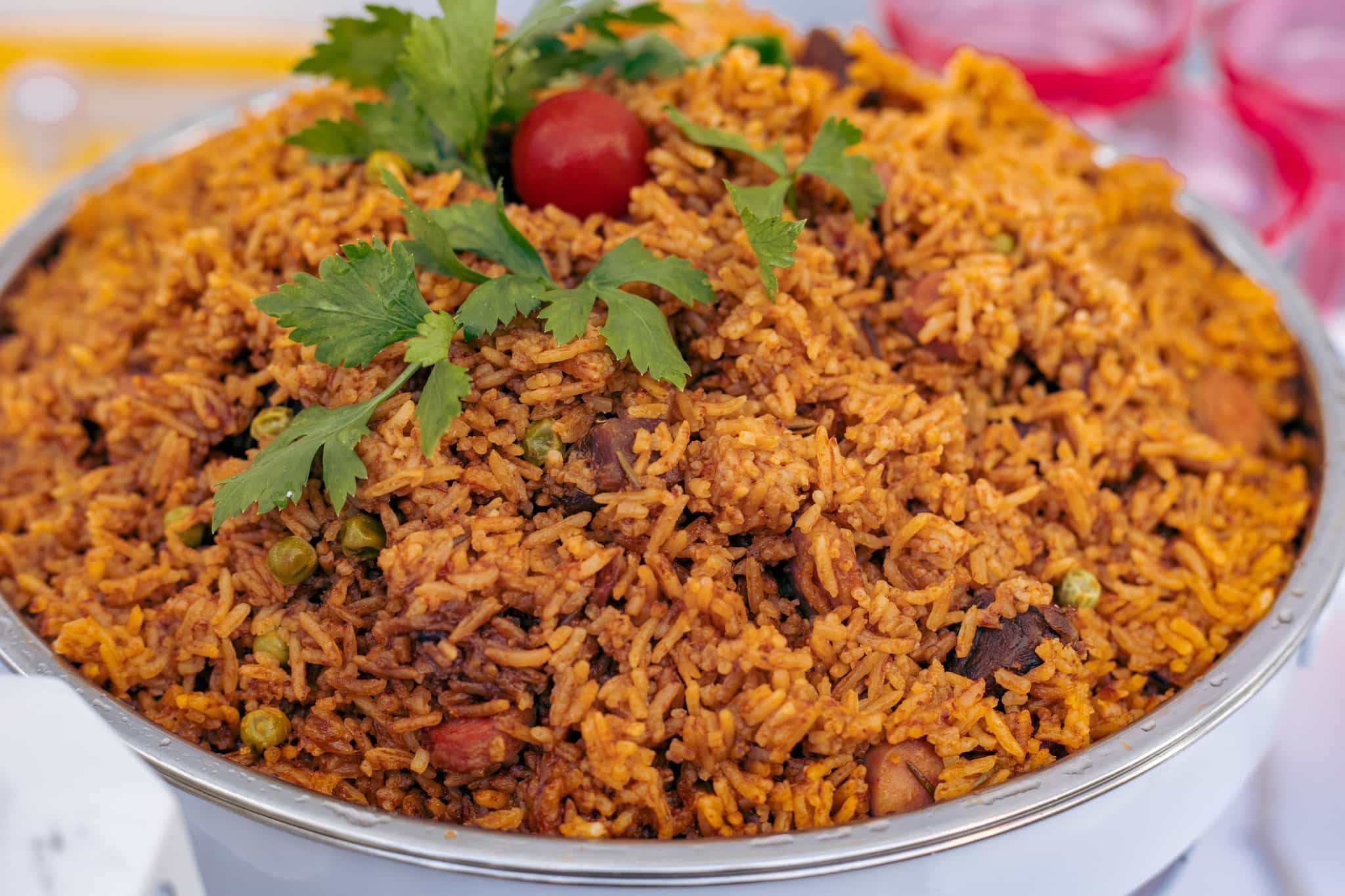
Ghanaian cuisine consists of a lot of tasty and spicy soups and stews, usually made with tomatoes, onions, pepper, ginger and a variety of local spices. Dishes are usually accompanied with starchy tubers like West African yams or plantains, as well as plain rice, jollof rice, waakye, agwa mu, fried rice... the list goes on. The southern region also grows the majority of cacao grown in Ghana (Ghana is the second-largest exporter of cacao beans), and during the trip you'll have the chance to learn about the harvest and production methods. Some common dishes you'll find in Ghana are: jollof rice (a one-pot dish of rice cooked with tomato sauce and served with meat or fish); waakye (a combination of beans and rice that was originally from the north, but can now be found throughout the country); tilapia (a common fish often grilled and served with banku, a mix of fermented corn and cassava dough, hot pepper, diced tomatoes, and onions); fufu (a staple food across West Africa, made by pounding a mixture of boiled cassava and plantains into a soft, sticky paste that is served with aromatic soups and stews). When meals are not included, your leader will be to hand to recommend various local dishes to try, depending on your taste.
Vegetarians, vegans and other dietary requirements and allergies can be catered for although be aware that options may be more limited – please just request this on your passenger info form.
What is the accommodation like?
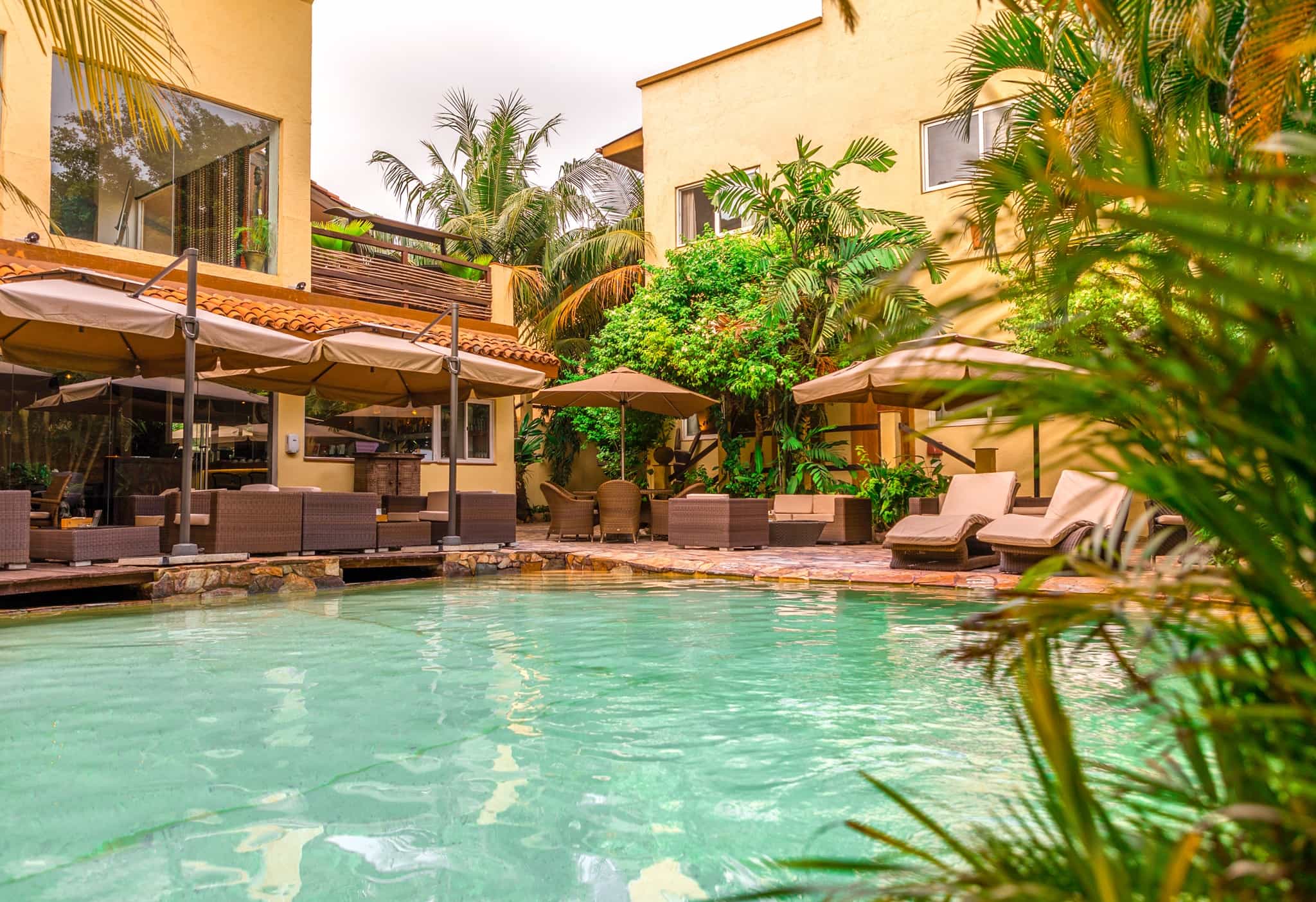
Accra
Spend the first night of your trip at La Villa Boutique Hotel. Surrounded by a lush green garden, it's an oasis of peace just minutes from the busy urban streets of Accra. Accommodation will be in air-conditioned twin-share rooms, decorated in a contemporary style. Each room comes with an ensuite bathroom and some also have a private balcony. You'll also have access to the plunge pool, the perfect way to relax after your flight.
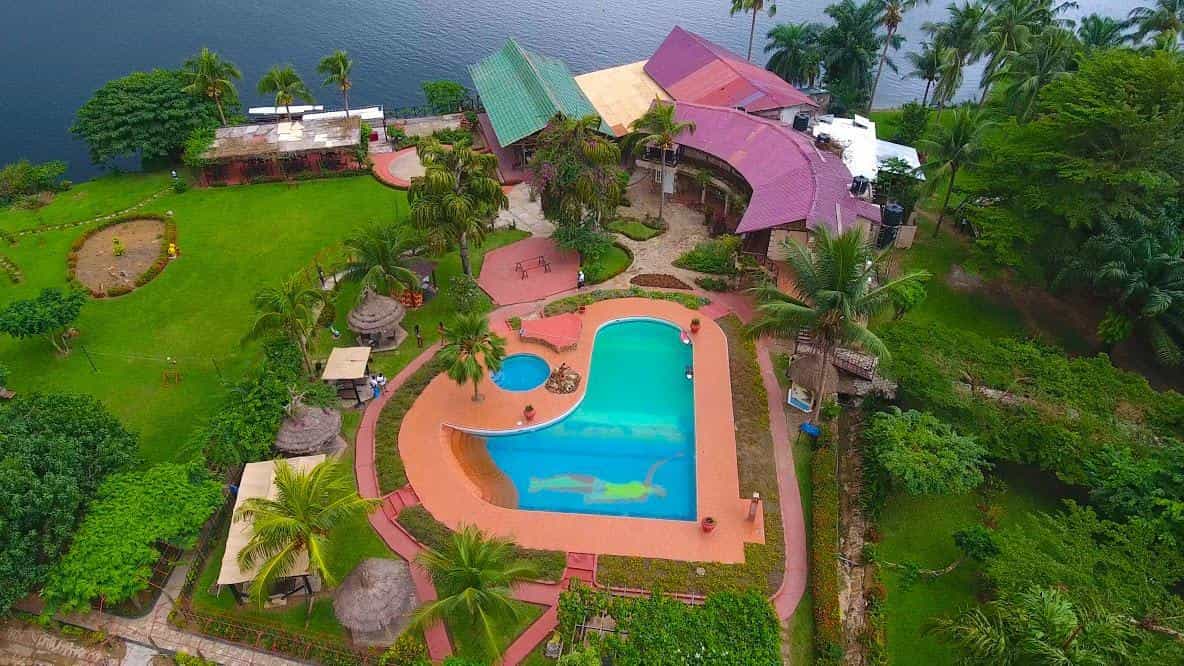
Akosombo
Spend two nights at Afrikiko River Front Resort, a hidden gem nestled along the banks of the Volta River in Akosombo. The 3-star property offers a tranquil escape, with twin-share rooms featuring modern amenities with a touch of traditional Ghanaian charm. The property is surrounded by lush gardens as well as a pool, with stunning views of the river.
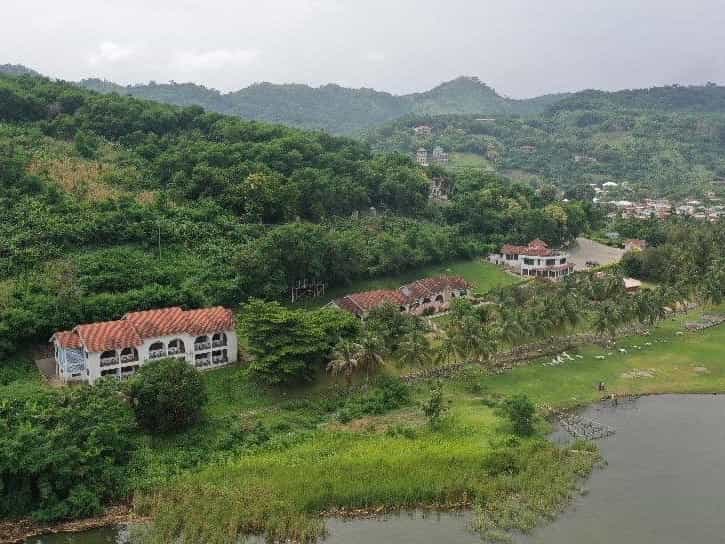
Lake Bosomtwe
Two nights of the trip will be spent at Lake Bosomtwe Paradise Resort, located right on the banks of the only natural lake found in Ghana – take in the views from its terrace and garden. You'll stay in twin-share rooms featuring private balconies, and ensuite bathrooms with complimentary toiletries.
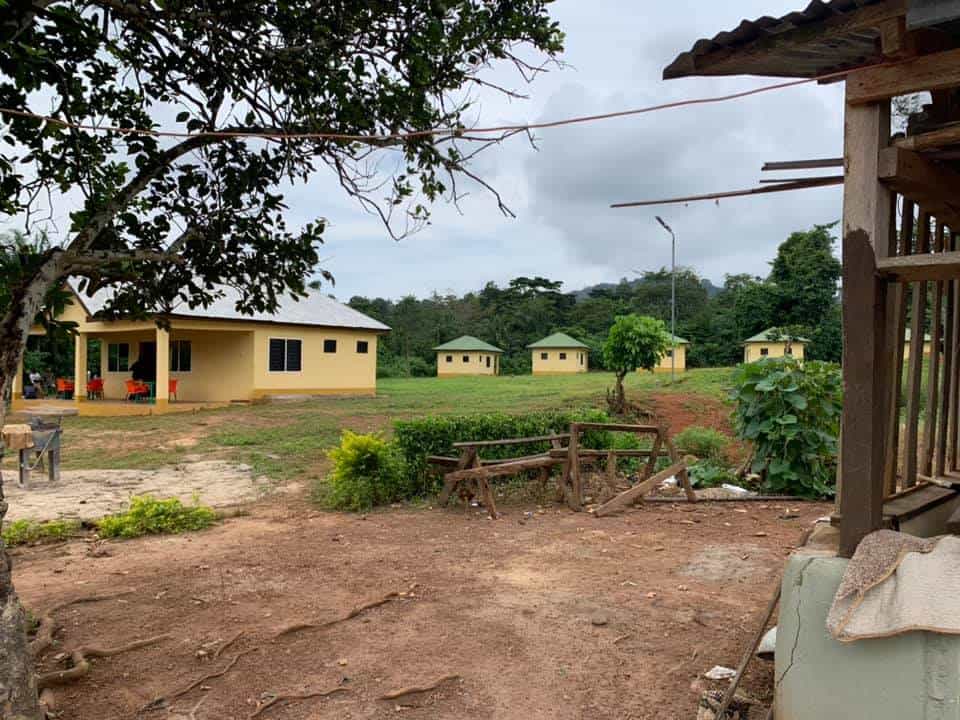
Bonkro
You'll stay one night in a specially constructed community guest house in the remote village of Bonkro, close to a wonderful forest habitat and hosted by friendly local villagers. The twin-share rooms are simply furnished but comfortable, and come with ensuite bathrooms.
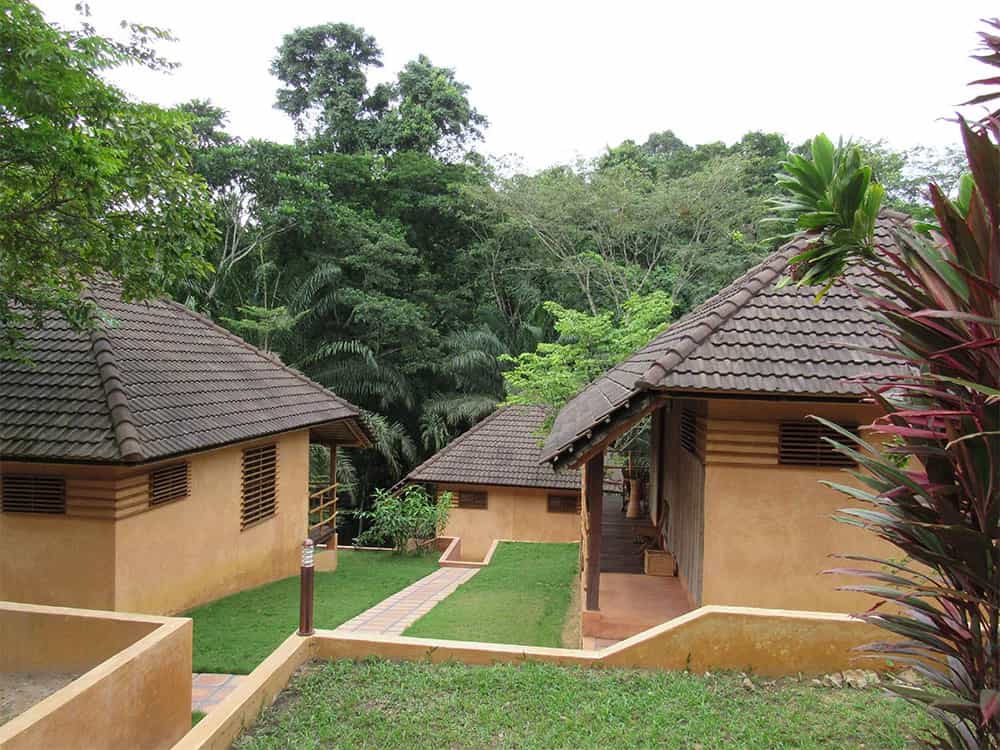
Ankasa Reserve
You'll spend two nights at the secluded Ankasa Reserve Lodge. Located along the Ankasa River, it's situated by the entrance to the Ankasa Reserve, Ghana’s largest and most biologically diverse area of Upper Guinea rainforest. You'll stay either in twin-share riverfront chalets or in traditional raffia huts, which come with ceiling fans to keep you cool. Each room also has its own private balcony looking towards Ankasa Rainforest and a separate private washroom. Nothing is more relaxing than listening to the sounds of Ghana’s finest rainforest, brimming with wildlife, maybe a troupe of monkeys calling in the distance or one of the beautiful forest birds perching close by.
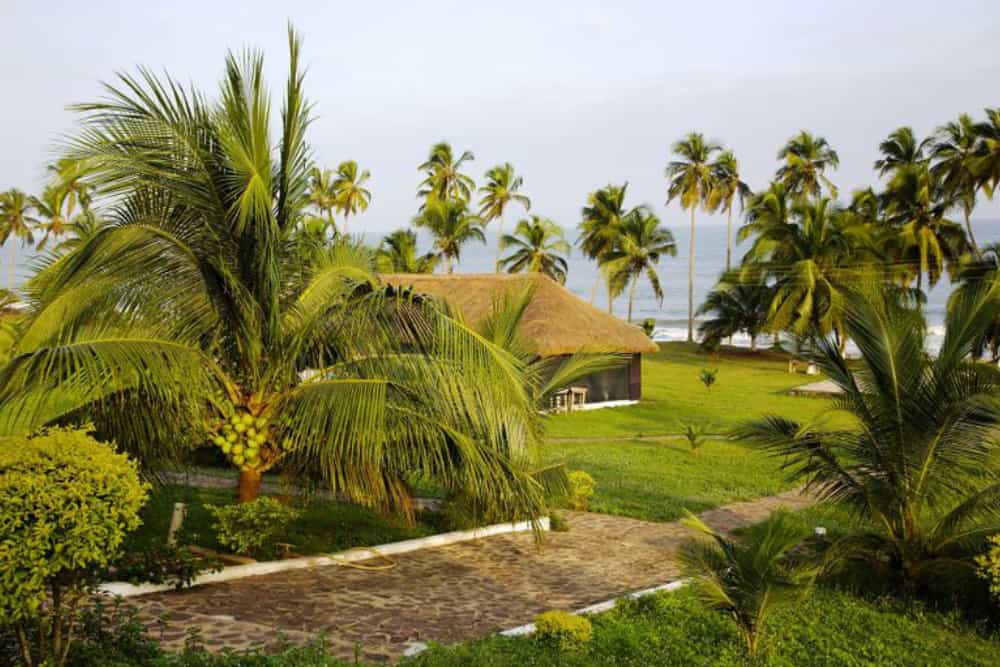
Gold Coast
Spend the final two nights of the trip at Brenu Beach Lodge, located on a golden-sand, coconut-lined tropical beach. The property includes a great restaurant and a pristine, clean, private beach area. The simply furnished but comfortable rooms are equipped with a private bathroom with a bath or shower and are air-conditioned.
Upgrades
For solo travellers looking for their own space, an optional private room can be booked for an extra charge, see Optional Extras for the price. Please request this at the time of booking (this is subject to availability).
This trip has been rated as Moderate
This trip is designed for those who thrive on adventure and have an interest for off-the-beaten path places, and are ready for a full-on experience. Each day, you’ll be on the move, exploring new places and diving into a variety of exciting activities, wild spots and some authentic cultural highlights. It's going to be a whirlwind journey, but the incredible landscapes, experiences, and memories you'll gain will make it all worthwhile.
A reasonable level of general fitness is recommended as you'll be participating in a variety of outdoor activities – a mixture of hiking, cycling and kayaking, each lasting between two and four hours. It's worth noting that whilst the distances and elevations do not seem particularly challenging in isolation, the hot and humid climate plus the busy schedule can add to the overall intensity of each day. Some of the trails can be steep, overgrown and you may encounter wet mud underfoot in some sections. The kayaking and cycling are short distances and are conducted at a leisurely pace. The cycling trails will be a mix of smooth roads and dirt roads with some gentle hills. Overall, previous experience is not needed but you must be comfortable in the outdoors, in the water and on two wheels. There are also several early starts in order to avoid the heat and make the most of your time in the destination, so a sense of adventure and willingness here is key to enjoying the experience.
The overlanding style of this trip means there are drives on most days, some covering long distances (up to seven hours, broken up with some stops along the way). To facilitate the travelling, we've planned for two consecutive overnight stays in most places, so that you won't need to pack up and move daily. This style of travel allows you to see the best of Ghana in the time available, including accessing some more remote rural areas and the best locations for exploring and experiencing the wild natural environment and local communities that make up the highlights of this trip. The driving is undertaken in a large, comfortable air-conditioned minibus but please note that road conditions in Ghana are not always the best, so expect potholes, unfinished road surfaces, and lots of wandering livestock, wildlife and people on the backroads.
What if i need to skip an activity?
Of course, you can always opt out of some activities should you prefer to take the trip at a slower pace. If you would like to skip an activity just speak to your guide who can make alternative arrangements or recommendations for you.
What will I need to carry?
You'll need to have a larger bag suitable for all your belongings which will be transported for you, and then a small daysack to carry personal items during each day of activities.
The climate in southern Ghana, where this itineray mostly operates, is tropical and records two rainy seasons: one long rainy season from April to June and a minor one from September to early November. The departures have been scheduled to avoid the major rains, although showers or unpredictable weather patterns are possible at any time of year. Temperatures are typically hot and humid throughout the year, with average temperatures around 30°C (86°F). Please note that the harmattan wind blows down from the Sahara from November or early December through to March. It can cool temperatures a bit and cause cloudy skies as well as extreme dryness – bring moisturiser and lip balm.




Culture! Culture! Culture!
The title of the review says it all. One of the best cultural experiences I have ever done. The highlight being the Ashanti Festival and being 5 yards from meeting the King (before getting asked which delegation I was with. . . oops!).
Superb guides in Victor and Mathais, who couldn't do more for us.
I can highly recommend the trip to anyone thinking of booking.



Warm welcome to the Ashanti Kingdom
The trip offers a wide range of experiences (hiking, biking, canoeing, culture festivals, a village stay, amazing food) and is a fantastic way to learn more about the Ashanti Kingdom and southern Ghana. I really enjoyed the trip, and much of enjoyment can be credited to the exceptional leadership and support of Victor and his team.
Be prepared for plenty of heat, sweat, and dirt when booking this trip—but you will be rewarded with stunning landscapes and memorable encounters with locals. If you are hoping to see large animals, this may not be the right destination, as such encounters are rare. However, there is a surprising beauty in the birds and smaller creatures.
Reading advice for the long drives: Homegoing by Yaa Gyasi.
Awesome Trip
Really enjoyed this tour of Ghana. Great way to experience the culture and natural landscapes of this fascinating country. Really well planned itinerary. Victor was an excellent guide. Highly recommended .
Ashanti Africa 2025
Amazing Trip - Would recommend to anyone who enjoys exploring new places, culture and hiking. Like no other trip I have done before !
Fantastic from start to finish
Amazing trip. So many amazing experiences. Every day was action packed but was never too busy. Amazing country and our guide Victor was very knowledgeable and always in control. 10/10
A great trip!
Ghana is a very welcoming and interesting country and the tour ran really well. Victor was a fantastic guide - he really made the trip. Supported by our fantastic driver Peter. A nice variety of activities and cultural stuff and the loveliest people. We had a great group which always helps make a trip very memorable. I look forward to my next trip to West Africa.
Itinerary Activities
- Guided hike in the Shai Hills Reserve
- Guided sunset kayaking on the Volta River
- Guided hike to Mount Afajato and Wli Falls
- Guided hike and bike tour along Lake Bosomtwe
- Entrance to the unique Akwasidae Festival
- Guided village experience and wildlife tracking in Bonkro
- Two guided forest hikes and one bike ride in the pristine Ankasa Forest Reserve
- Guided excursion by canoe to Nzulezu Stilt Settlement
- Guided kayaking to Brenu Beach Lodge
- Guided jungle hike in Kakoum National Park including the canopy walkway
Guides
- Expert, local, English-speaking guides
Accommodation
- 1 night in charming boutique hotel in Accra
- 2 nights in a picturesque riverside hotel in Akosombo
- 2 nights in a scenic hotel on the banks of Lake Bosomtwe
- 1 night in a community-run guesthouse in the remote village of Bonkro
- 2 nights in a forest lodge in the pristine Ankasa Reserve
- 2 nights in a beach hotel on the Gold Coast
Meals
- All breakfasts
- 6 tasty lunches
- 6 Ghanian dinners
Transfers
- Arrival transfer from Accra Airport at any time on Day 1
- Group departure transfer to Accra or Accra Airport on Day 11
- All transfers during the trip
Equipment
- All your cycling and kayaking equipment
Permits
- All park permits and entry fees
Our trips are hassle-free by design. We include all the activities and equipment, as well as many of the meals, so you can simply rock up with your rucksack and share the adventure with your new pals.
Travel to and from the trip
Our trips do not include flights, trains or other travel to the start point and back from the end point.
Tips
Tips are not included in the trip cost. These are entirely at your discretion but there is an expectation to tip for good service. Your guide will help with advice, however we suggest the below as a guideline per person:
- USD $40-50 per person for the main guide
- USD $25 per person for the driver
- USD $20 per person to distribute to the various guides locally
Of course, you are free to tip more or less, and the amount should be reflective of your perception of service and quality – a tip is not compulsory and should only be given when you receive excellent service.
Travel insurance
Travel insurance is compulsory for all of our adventures, and you'll need to provide your policy details before departure. Your insurance should offer adequate cover for overseas medical treatment, evacuation/repatriation, your baggage and equipment, and the specific activities involved in your adventure. We also recommend ensuring your policy includes cancellation and curtailment cover, in case you're unable to join your trip due to unforeseen circumstances such as illness.
Standard travel insurance may not cover all the activities included in your adventure, so it's essential to check the details carefully. There are adventure-specific providers that many travellers have used in the past, such as True Traveller (for those based in the UK or Europe), or Rise + Shield, both of which offer cover for a wide range of adventurous activities.
Please make sure your chosen policy meets your individual needs and covers all aspects of your trip.
Visas
Visa requirements often change, and you are responsible for obtaining any required visas for this trip. Please check with your nearest embassy or consulate for up-to-date advice.
Personal Expenses
You know your own spending habits best, so please budget an appropriate amount for things like optional meals and drinks, shopping, optional activities, and laundry.
What do I need to bring?
BAGS
- Soft overnight duffel bag or rucksack
- Daypack (20-30 litres)
- Waterproof liner for kitbag/rucksack, or drybags
CLOTHES
- Waterproof jacket
- Waterproof trousers
- Lightweight trousers/shorts/skirts
- Long trekking trousers and long-sleeved shirts for forest treks
- T-shirts
- Underwear and socks
- Swimwear
- Sunglasses
- Sunhat
- Sleepwear
- Hiking boots or shoes (worn-in) - the trails can be very muddy so bring shoes with good grip for the hikes
- Sandals
- Flip-flops
OTHER
- Yellow Fever vaccination certificate (compulsory)
- Universal travel plug adapter
- Power bank or solar charger
- Passports (and visas)
- Travel insurance documents
- Ear plugs
- Insect repellent
- Suncream
- Personal first-aid kit (inc. blister treatment and antimalarial tablets)
- Personal items (biodegradable toiletries, sanitary wear etc)
- Quick-dry towel
- Alcohol hand-gel
- Headtorch or torch
- Reusable water bottle x2 litre (free filtered water will be avbailable throughout the trip and provided by your host)
- Biodegradable wet-wipes
- Energy bars and snacks
Additional Night in Accra Single Room
Payable Before Departure
Additional Night in Accra Single Room
… Per night
Additional Night in Accra Twin/Double Room
Payable Before Departure
Additional Night in Accra Twin/Double Room
… Per night
Optional Private Room Upgrade - 2025
Payable Before Departure
Optional Private Room Upgrade - 2025
…
Optional Private Room Upgrade - 2026
Payable Before Departure
Optional Private Room Upgrade - 2026
…
Private Arrival Transfer Accra Airport - Accra Hotel (per person)
Payable Before Departure
Private Arrival Transfer Accra Airport - Accra Hotel (per person)
… Per person
Private Departure Transfer Accra Hotel - Accra Airport (per person)
Payable Before Departure
Private Departure Transfer Accra Hotel - Accra Airport (per person)
… Per person
We partner with the World Land Trust to ensure this trip achieves Net-Zero emissions. We also support their Buy an Acre programme, helping local communities to buy and protect natural habitats in perpetuity.
What's the number?
It works out on average at 292kg of CO2 emissions per person, including all local transport, accommodation, food, activities, guides, staff and office operations.
The only thing it doesn’t include right now is flights and travel to the destination. We do make an overall estimate across all our customers separately, but as we don’t book flights, have customers from all corners of the world, and no way of reliably knowing their travel plans, we simply can’t include an individual number in the figure on display here. We’ve got a goal to fix that, so that when you book, there is a way to measure and mitigate the carbon emitted by your flight too.
But what does the number mean?
Yep, hard to picture eh? To give you an idea:
- Driving 1000 miles/1609km would be approximately 281kg of CO2 in an average car (or 140.5kg per person, if there were two of you in it).
- A return economy class flight between London and New York would be approximately 1619kg (1.66 tonnes) per person.
- 10 trees in a temperate forest are estimated to remove approximately 250kg of CO2 from the air in a period of 5-10 years.
What are we doing about it?
Our trips are relatively low-carbon by design, and we're working with all our hosts to develop long term carbon reduction plans. We partner with the World Land Trust to ensure this trip achieves Net-Zero emissions. We also support their Buy an Acre programme, helping local communities to buy and protect natural habitats in perpetuity, ensuring the protection of the reserve and its wildlife.
Want to know more?
Amazingly, no international travel company has ever publicly published their carbon measurements before, as far as we know. We believe that must change, quickly. So we’re openly sharing the method we used in the hope that other companies will be able to more easily follow suit and build on what we've done so far. You'll find it all here.
You'll be led by a local, expert, English-speaking tour leader. Some of the hikes or activities will be also accompanied by additional specialist guides, such as forest rangers. You'll also have a professional driver with you throughout the trip to transport you and your main overnight luggage.
Marta Marinelli, raised in Italy’s serene Prosecco Hills, dreamt of global adventures, inspired by her father's travel stories. Her passion evolved into a career, backed by a decade of studies including degrees in international tourism and destination management. She’s worked in the adventure travel sector since 2012, living in Italy, the UK, and now sunny Portugal.
Over twenty years, Marta has explored over 60 countries, visiting remote areas like Ghana, Rwanda, Sao Tome and Principe, Haiti and Nepal’s Upper Mustang region. As a Senior Adventure Expansion Manager at Much Better Adventures, she focuses on creating life-changing experiences, ranging from multi-activity adventures and challenging treks to ultimate adventures in iconic places. She loves the challenge of finding the best local adventure hosts around the world, collaborating on adventures that offer genuine immersion, pushing beyond the beaten path and working on exclusive itineraries that challenge your comfort zone.
What makes her tick? Enabling people to live adventure-rich lives while positively impacting and empowering local communities around the world, generating sustainable opportunities for both the host, guides, community and the environment.
Unlimited filtered water is available for the duration of the tour and will be provided by your host. So just bring a couple of refillable bottles to avoid purchasing single-use plastic locally.
The trip is run by an experienced and established local host who is committed to operating low-impact, ethical tours in order to create authentic, cultural connections. This not only enhances the traveller experience, but also creates economic opportunity and social development locally, whilst preserving cultures in this region for future generations. Your host is West Africa’s leading travel company and part of their profits go back into building schools, protecting wildlife, rainforest, biodiversity and connecting communities to the conservation of their environment. Here are just a few of their key guiding principles and successful initiatives:
- They run their own NGO organisation called Rainforest Rescue Ghana
- They only use locally-owned and locally-operated infrastructure; all staff members are local
- They have an ongoing reforestation project where they have commited to planting 75,000 indigenous trees. In addition to this, they purchase and plant three indigenous forest tree species for every guest that travels with them. The main aim for this project is carbon offsetting – guests choosing to join this trip would offset their flights to/from Ghana by more than 15 times if the trees live to their expected lifespan.
- At their project sites and in areas they visit they advise local communities on how to reduce their plastic waste and use more organic materials instead, when possible.
- They directly support various local charities and organisations, having actively contributed to school building projects, sponsored local girls’ and boys’ football teams, and built tourist accommodation in Bonkro (where you'll stay), with all income generated going into the community fund
- They sponsor 23 community forest committee members who patrol and protect the forest from illegal logging and hunting.
One of the great highlights of the trip will be attending the Akwasidae Festival, one of the most important events celebrated by the Ashanti people in Ghana. It is held every six weeks, on a Sunday; it is a time for the community to gather and celebrate their cultural heritage while giving thanks to their ancestors. It is very much an essential and authentic part of Ashanti culture to this day and is not staged for visitors. The word 'Akwasidae' means 'the day of the sacred stool' in the Ashanti language and it refers to the sacred stool, a symbol of unity and strength, brought out for all to see and to pay homage to. The festival will involve a procession of chiefs and elders who make their way to the palace of the Ashanti king, the Asantehene. The king also attends, sat on his throne, surrounded by his advisors and other dignitaries, while the people gather around dressed in traditional colourful kente cloths to watch the proceedings. It will last a few hours and it will be a joy to watch the vibrant and colourful celebrations, full of energy, excitement and music.
You'll usually be provided with Cambridge Sunfish sit-on-top leisure kayaks, which seat two people, or Zander sit-on-top single-person kayaks (on request). The maximum combined paddler weight is 220kg.
You'll be provided with Rockrider mountain bikes. Please provide your height upon booking so that the right bike frame can be assigned to you.
To better understand and respect cultural differences in Ghana, please keep the following information in mind:
- Ghanaians tend to dress more conservatively than in Western cultures. In rural areas and more formal settings, it is considered inappropriate for women to wear sleeveless or low-cut tops, or short shorts or skirts.
- Greetings are important in Ghana. Whenever you pass a group of people (especially if they are elderly), it is expected that you greet them. When approaching a group, it is polite to greet and shake hands if possible.
- Public displays of affection between men and women are not common in Ghana, even between spouses. Men may hold hands or hug, but male/female relationships are strictly controlled. In public, it is best to display a quiet, careful, and friendly attitude. -It's important to remember to ask permission before taking pictures of people, as a sign of respect.
This trip takes place in environments where wild animals are present in their natural environment, where protections and controls on their movement may be limited or non-existent. Some species may be dangerous, venomous, or unpredictable. Sightings are a privilege, but safety is key. Always follow your guide’s instructions and any posted signage.
We recommend considering your comfort around wildlife and discussing any concerns with your host before travel, particularly if you have allergies, phobias, or related health conditions.
This trip operates in areas where daytime temperatures can reach extreme levels, with limited shade and, at times, high humidity adding to the challenge. These conditions can affect physical performance and increase the risk of dehydration or heat-related illness. Your guide will adjust the pace and monitor the group closely, but staying well hydrated, wearing suitable clothing, and using sun protection is essential.
Before travelling, consider your ability to remain active in high temperatures and consult a medical professional if you have any concerns, especially if you have cardiovascular or heat-sensitive conditions. Arriving a day or two before the trip may help you adjust gradually to the heat.
Sure can! Over 70% of our travellers travel solo, it’s a great way to meet like-minded people.
Our team of Adventure Hunters co-create exclusive adventures which are run by highly vetted, specialist hosts. The trip is run by our trusted host partner in the destination. We only work with independent, local, in-destination experts who know the very best places to explore and how to stay safe. Read more information about the local teams we partner with. You’ll be introduced to the host straight after making a booking via the Much Better Adventures platform.
Much Better Adventures refer to the UK Government’s official travel advice when designing trips and monitoring trip operations. We recommend that all customers are familiar with the practical information provided on the Government’s FCDO website, where current travel advice can be found by searching for the applicable destination(s).
For customers joining this trip from other international destinations – please also read the official travel advice applicable to your country of residence/origin, as this may differ.
We recommend checking out the country-specific information and also talking to a travel nurse.
We automatically convert prices from the local currency that a host receives to your chosen currency. We update our exchange rates on a daily basis so this does mean that prices displayed on the site are subject to currency fluctuations, which is why you may see them change over time.
If you wish to change the currency you pay in, head to the bottom of the page.
All of our group adventures are specially designed for adults to enjoy as we want these adventures to bring together outdoorsy people who are truly like-minded. You must be over 18 to join one of our trips.
You're always in good company on one of our adventures.
Our trips are typically made up of a mixture of solo travellers and small groups of 2 or 3 friends, with most in their 30s-50s.
Our sociable adventures are solo-friendly by design and naturally attract outdoorsy people with a shared mindset; a love for adventure, a desire to push themselves and meet awesome, like-minded people along the way. Check out our Community Values – a shared code to make sure that everyone's experience is safe, inclusive and brilliantly unforgettable.
It’s this camaraderie that has so often turned a great adventure into a life-changing one.
Don't just take our word for it:
- 95% of people rate the group dynamics on our trips 5/5
- 90% of people recommend joining a trip to make new friends
- 75% of people have met people on our trips that they would now consider friends
See here for more info about the Much Better Adventures tribe.
Reviews

Culture! Culture! Culture!
Gary B. January 2026

Warm welcome to the Ashanti Kingdom
Kirsten T. January 2026
Awesome Trip
Dominic C. November 2025
"Really enjoyed this tour of Ghana. Great way to experience the culture and natural landscapes of this fascinating country. Really well planned itinerary. Victor was an excellent guide. Highly recommended ."
Ashanti Africa 2025
Matthew T. November 2025
"Amazing Trip - Would recommend to anyone who enjoys exploring new places, culture and hiking. Like no other trip I have done before !"
Fantastic from start to finish
Andrew T. November 2025
"Amazing trip. So many amazing experiences. Every day was action packed but was never too busy. Amazing country and our guide Victor was very knowledgeable and always in control. 10/10"
A great trip!
Rachel C. November 2025
"Ghana is a very welcoming and interesting country and the tour ran really well. Victor was a fantastic guide - he really made the trip. Supported by our fantastic driver Peter. A nice variety of activities and cultural stuff and the loveliest people. We had a great group which always helps make a trip very memorable. I look forward to my next trip to West Africa."
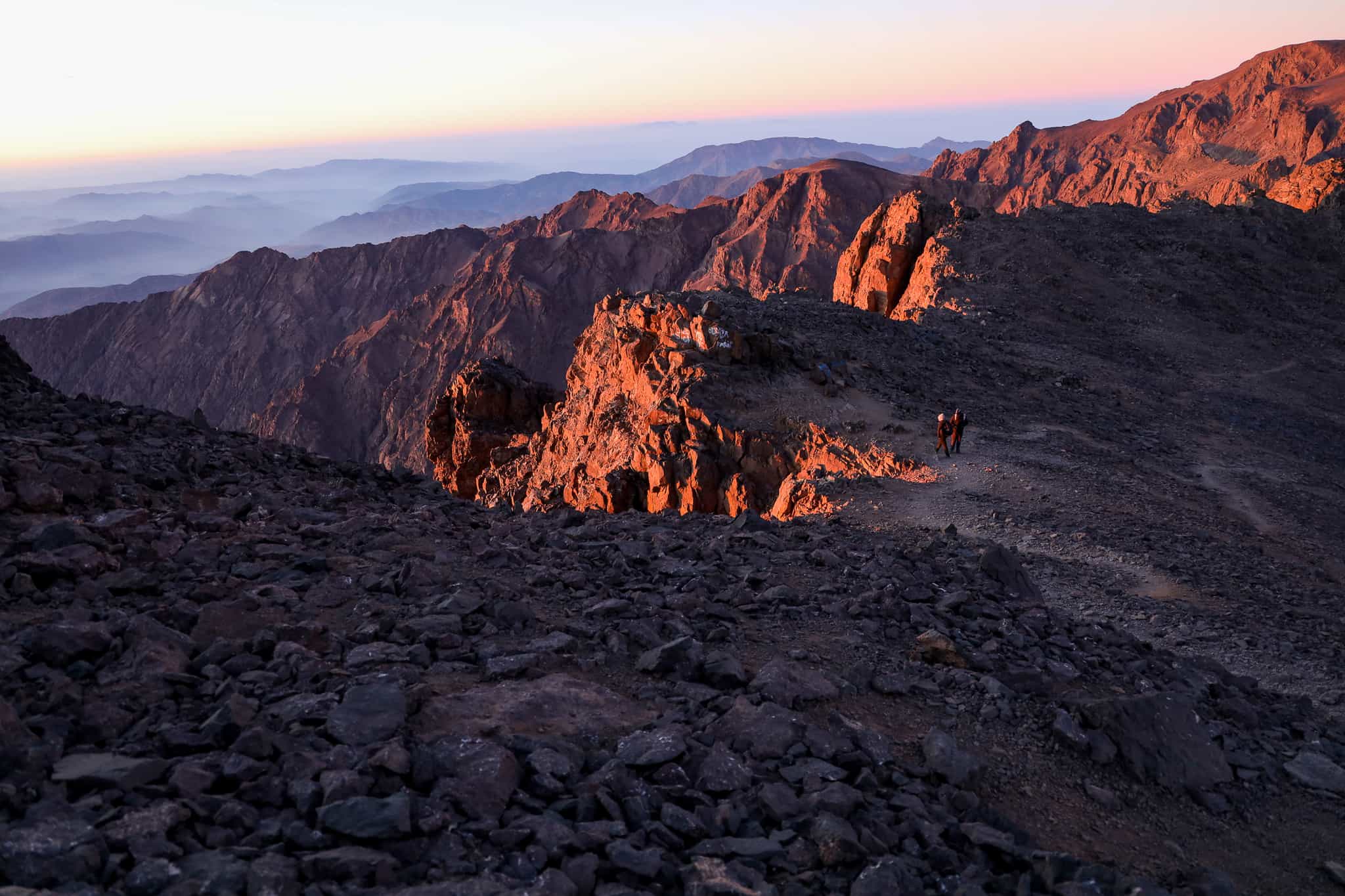
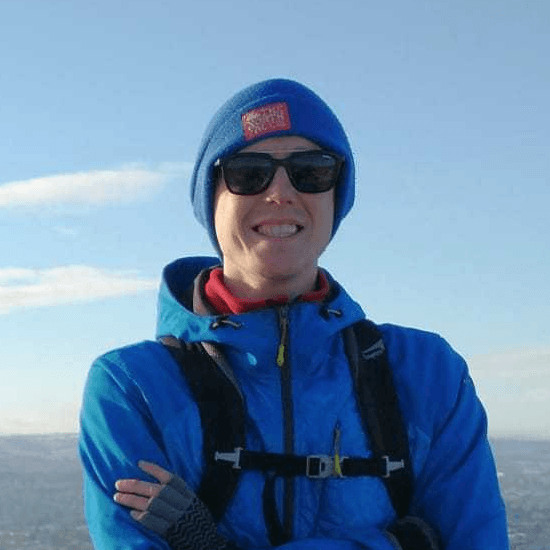
How fit do you need to be?
Every trip is different. Our friendly experts are here to help, whether it's about altitude, terrain, or recovering from injury.
We've got your back
Guaranteed to run
All Much Better Adventures trips are now guaranteed to run. Once you’ve booked your spot you can immediately make your travel arrangements, no uncertainty, no hanging about (excludes 'request to book' departures). Full details
Flexible payments
Secure your spot with the minimum deposit and pay off the remaining balance in as many instalments as you like, with no interest or fees. Full details
Happiness Guarantee
We’re so confident you’ll have an amazing time we’ll put our money on it. Full details
Full financial protection
To give you complete peace of mind Much Better Adventures is backed by ABTOT, ABTA and ATOL memberships. Full details
Tried & Trusted
Much Better Adventures is consistently rated ‘Excellent’ on Trustpilot with over 1300 verified trip reviews.
Connect before you go
You'll be invited to join a WhatsApp group to get to know each other before your big adventure together. Full details
DEPARTURE DATES
Wednesday 15th July 2026
to Saturday 25th July 2026
2026 Sale Offer - Next 4 spots available at 5% off





